
The Award-Winning Publication of the Berks County Bar Association


The Award-Winning Publication of the Berks County Bar Association
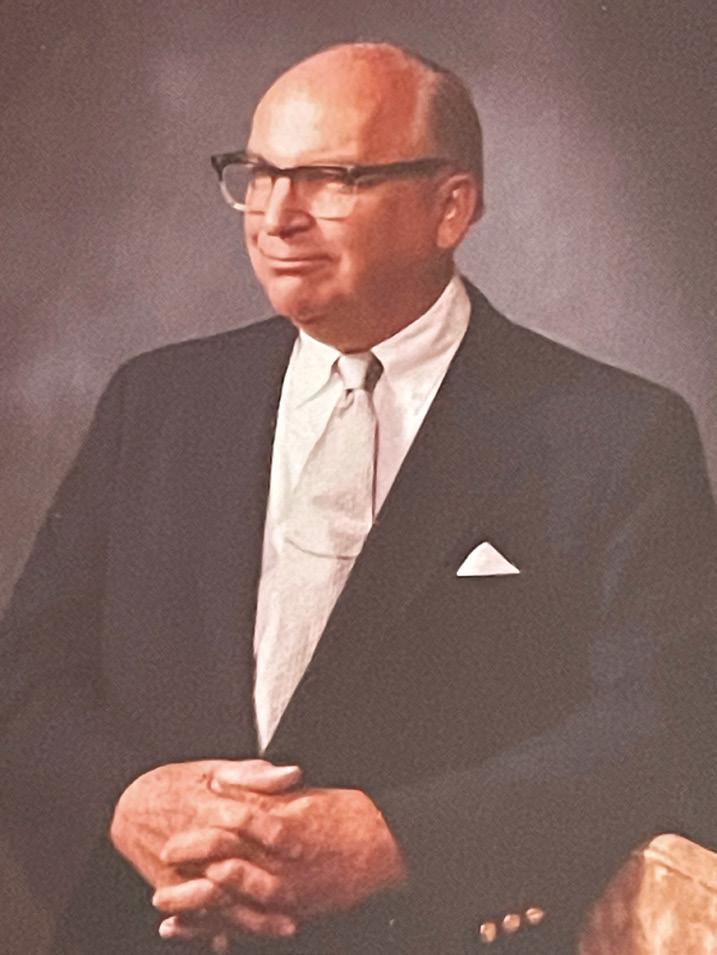
James Stoudt, Esquire




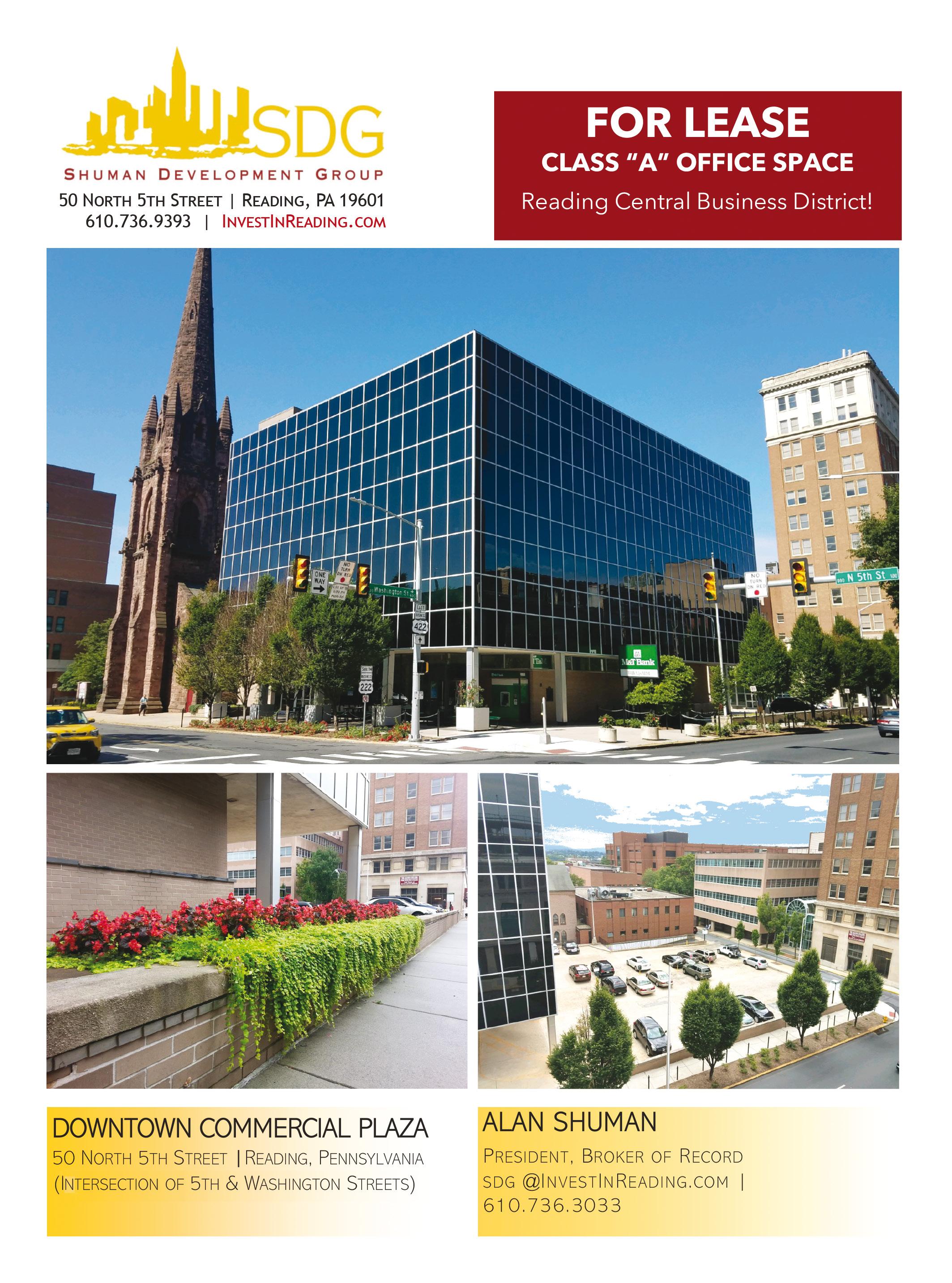

KAREN H. COOK, President
DANIEL C. NEVINS, President-Elect
PETER F. SCHUCHMAN, JR., Vice President
JACQUELIN M. HAMER, Secretary
ANDREW F. FICK, Treasurer
DANIEL CORTES, Director
SARA R. HAINES CLIPP, Director
JAY M. KURTZ, Director
JESSE C. LEISAWITZ, Director
LAUREN M. MARKS, Director
MARK E. ZIMMER, Director
GABRIELA G. RAFUL, Immediate Past-President
GREGORY E. SCOTT, President YLS
KORI A. WALTER, Executive Director
ROSE M. JOHNSON, Law Journal Secretary/Office Manager
COURTNEY MORSTATT, Publications & Marketing Coordinator
LUCY BRITO, Community Service Manager
J. CHADWICK SCHNEE, Law Journal Editor
VALERIE KRAMER, Law Journal Assistant Editor
PAMELA VANFOSSEN, Barrister Editor
Please submit materials or comments to: Berks County Bar Association 544 Court Street, P.O. Box 1058 Reading, PA 19603-1058
Phone: 610.375.4591
Fax: 610.373.0256
Email: info@berksbar.org www.berksbar.org
Thank You
Our thanks are extended to the numerous people who have contributed to The Berks Barrister Your time, energy and efforts are sincerely appreciated.
2669 Shillington Road, #438 Reading, PA 19608 www.Hoffpubs.com



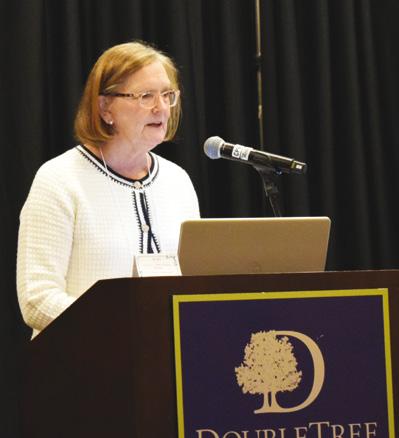

Karen H. Cook, Esquire
2024 Berks County Bar Association President

As I mentioned in my remarks at the annual meeting in November, when I first began practicing law, our firm’s senior partner, the late Hon. Thomas Golden, encouraged me to become involved with the Bar Association.
He encouraged me to be active in our various committees and sections and to attend as many events as I could.
I joined the Young Lawyers Section and eventually served as its Secretary and President. The Stepping Out program presented to high school seniors was fairly new at that time. I volunteered to present at my alma mater, Governor Mifflin High School, to the high school seniors about their responsibilities as young adults as they turned 18. I also became a member of the Law Journal Committee where I learned about publishing the Berks County Law Journal and eventually chaired that committee. I remain a member of the committee to this day.
In addition, I became active in the Environmental Law Section and other committees and sections related to my areas of practice over the years. By being a member of these sections and committees, I learned about the Bar Association operations and enhanced my knowledge of the areas of law in which I practiced. I encourage all young lawyers to join the Young Lawyers Section and become an active member of that section. It is a good way to meet and socialize with other young lawyers. Our Young Lawyers Section provides opportunities to participate in its programs, such as Stepping Out and Wills for Heroes.

President Cook reads to students at Riverside Elementary School during the Law Foundation of Berks County’s Book ’Em program. Every pre-Kindergarten and Kindergarten student in Reading School District receives a donated book and volunteers read in all of those classrooms each spring.
Judge Golden also encouraged me to volunteer with other community organizations. There are many nonprofit organizations and clubs in our community that rely on the work of volunteers to operate and provide services to others. I joined the board of directors of the Penn State Club of Berks County, which met locally at Berks Campus. I am a Penn State graduate and attended Berks Campus for my first year and a half at the University, so I was interested in helping the local club plan activities for Berks County Penn State alumni and the students at Berks Campus. These included a welcome reception for the new students each August and hosting an annual golf outing to raise funds for the club and Berks Campus.
Continued on next page



Continued from page 5

President Cook helps students prepare their oral arguments during a Mock Supreme Court event on April 18 at Reading Area Community College’s Miller Center. The Rendell Center organized the event that brought Berks County high school students and RACC students together to learn about the courts and the role of judges.
My early service to the Bar Association and on the Penn State Club of Berks County board of directors were the start of my journey in volunteering for various other organizations and serving on other boards over the course of my career as an attorney. For many of the boards I served on, I offered my legal knowledge helping to amend the bylaws and review or prepare contracts for several nonprofits.
Volunteering is the offering of one’s time, talents, and energy to others or to an organization that helps others by providing goods, services, and/or funding to those the organization serves. Volunteering can also involve becoming an active member of a club or organization in which you have a common or social interest. Volunteering involves giving back to and serving others.
I have a passion for volunteering! I encourage everyone reading this column, no matter what stage of your career you are in, to volunteer with an organization that you are a member of or join one that you have an interest in and become involved. If you are asked to serve on a committee or a board, seriously consider doing so. If you say yes and get involved, in addition to benefiting the organization, you will benefit as well.
Volunteering gives one a sense of purpose and accomplishment by helping others or an organization. It gives you the opportunity to learn new skills, to develop leadership skills, and to learn about a subject area beyond what you know from practicing law. This can broaden your perspective and make you a better, well-rounded attorney. Other benefits of volunteering are strengthening and giving back to your community and strengthening and growing the organization you are a part of. Volunteering also gives you the opportunity to meet and socialize with others and form friendships. One of my good friends is a woman I met while serving on the board of directors of the Penn State Club of Berks County many years ago. Another good friend is a woman I met while volunteering on a committee at our church. Volunteering can also help you
Our clients have grown with us over the last 70 years, and we thank them for their challenges, commitment and dedication. Our employees appreciate every one of you!

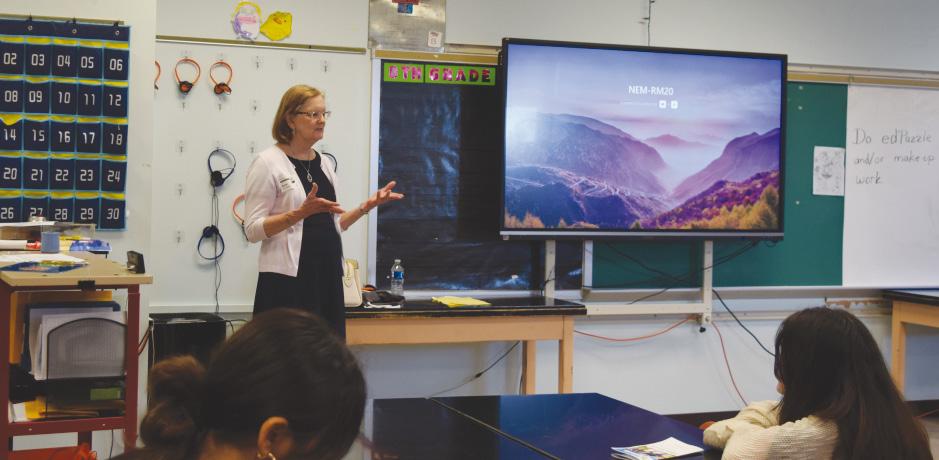
Visiting schools to discuss careers in the law and law-related fields is one of many ways to volunteer. Bar Association President Karen H. Cook spoke to students at Northeast Middle School in Reading on May 23 as part of the Reading School District’s Career Pathways Program.
meet those who may become a future client or a referral source for clients. Volunteering can also be a stress reliever because you are getting involved in an activity outside of your daily practice of law, which allows you to focus on something other than the problems or matters you handle for your clients daily. I recall one board I served on that met at night. On the day of board meetings, I often would think I did not have the time to attend the meeting because of my workload. Once I got to the meeting, I was able to forget about work and relax and focus on the work of that board.
An easy way to start is by becoming an active member of our Bar Association. If you are already involved with the Bar
Fast Forward Office Technology
524 Penn Ave, West Reading, PA 800-952-4426 • www.EdwardsBusiness.com

Association, consider joining a new committee or section. Our Bar Association has almost forty committees and sections, any of which would welcome new, active members and new ideas.
Many of you attended one or both of two recent events the Bar Association held, the Bench Bar Conference in April and the annual Law Day luncheon in May. Both of these events and others, such as the golf outing and picnic organized by the Entertainment Committee, require a lot of planning and coordination to run smoothly. The Bench Bar Conference relies on the Bar Association committees and sections to come up with ideas and presenters for the CLE seminars, which allow our members to earn half of their required credits in just one day. If you are a member of a committee or section, volunteer to present a CLE at a luncheon seminar or at next year’s Bench Bar Conference. We are always looking for informative CLE topics for lunchtime seminars and the Bench Bar Conference.
This year, a theme of my presidency of the Bar Association is supplementing civics education in our local schools. I have contacted several school districts to arrange for our members to speak to the students about careers in the law. We are working on presenting to more classes in the fall. If anyone is interested in going to the schools to talk to the students about what you do as an attorney, please let myself or our Executive Director, Kori Walter, know.
I encourage all of you to volunteer. In addition to benefiting others, you also will benefit and be glad you did.
By Lisa Siciliano, Esquire
In February, Berks County had the honor of hosting the Region 5 District 1 mock trials on several evenings for high school teams from Berks, Lehigh, and Northampton Counties. Berks County hosts Districts every three years. Mock Trial Committee co-chairs Lisa Siciliano and Jason Glessner worked with the PBA, local schools, and the county courthouse to accommodate the nine schools that would be visiting and competing to move onto regionals.
This year’s mock trial involved a murder committed in fictitious Wisawe, Pennsylvania. Rival restaurant and bar owners were fighting against one another to gain more business. One of the owners is found dead, having been shot and killed at their desk execution style. A competitor is charged with First Degree Murder and Conspiracy to Commit Murder. Are they guilty, or were they falsely accused of this brutal crime? The students read the materials, prepared for months, gave opening statements, examined and cross-examined witnesses, made objections, and gave closing statements.
After the preliminary rounds, the competition was down to 4 teams. Two semi-final trials were held with the winners competing in the District Final. That Final was between Fleetwood Area High School from Berks County and Nazareth Area High School from Northampton County. By the slimmest of margins, Nazareth won. Wyoming Seminary from Luzerne County had won District 2, came to Berks to compete in the Regional Competition, defeated Nazareth, and moved onto the State Competition. Wyoming Seminary was then defeated by Abington Heights High School from Lackawanna County at States. Abington Heights went to the National Mock Trial Competition in Wilmington, DE on May 4th and became the 1st Pennsylvania team to win Nationals.
We want to thank the judges, magisterial district judges, and attorneys who volunteered as Presiding Judges and Scoring Judges who made the entire competition possible and provided a great experience for the student competitors who may one day be our future lawyers and judges.
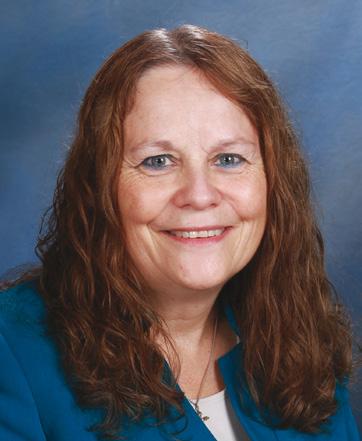
Ms. Siciliano is the Family Court Administrator in Berks County and Chair of the Bar Association Mock Trial Committee.
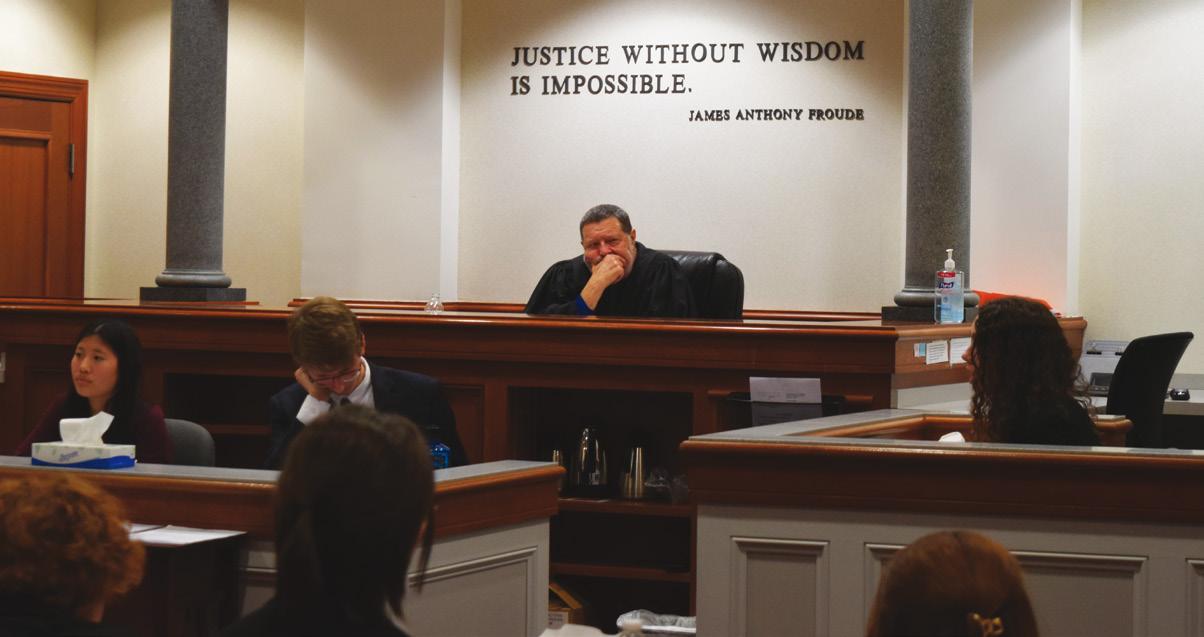
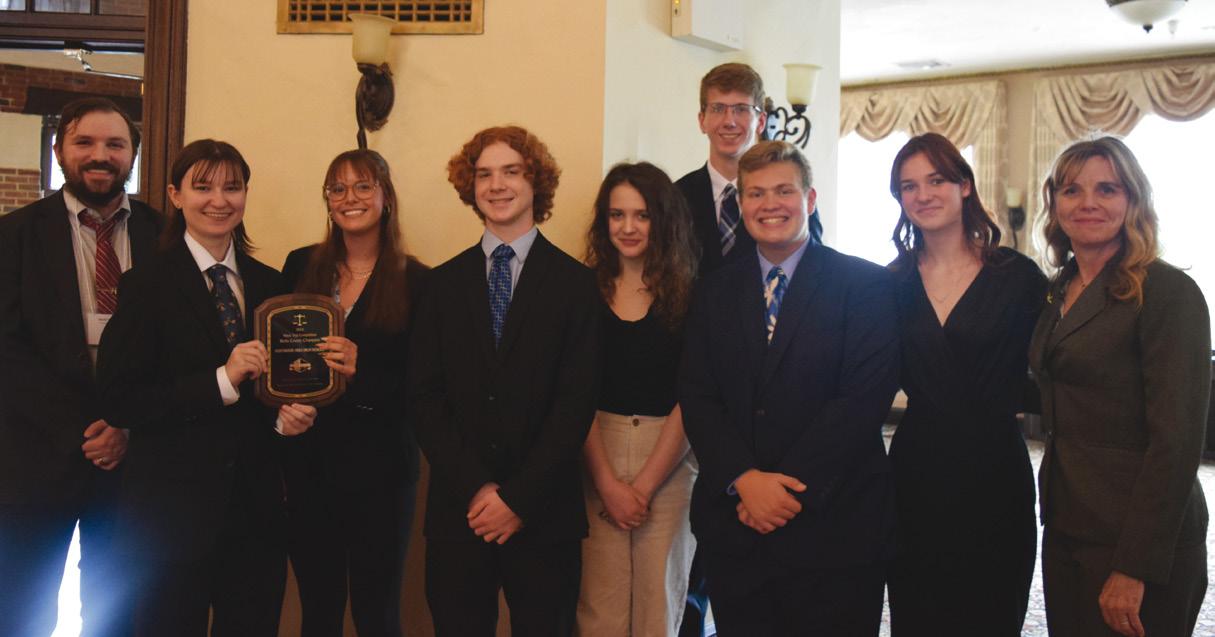

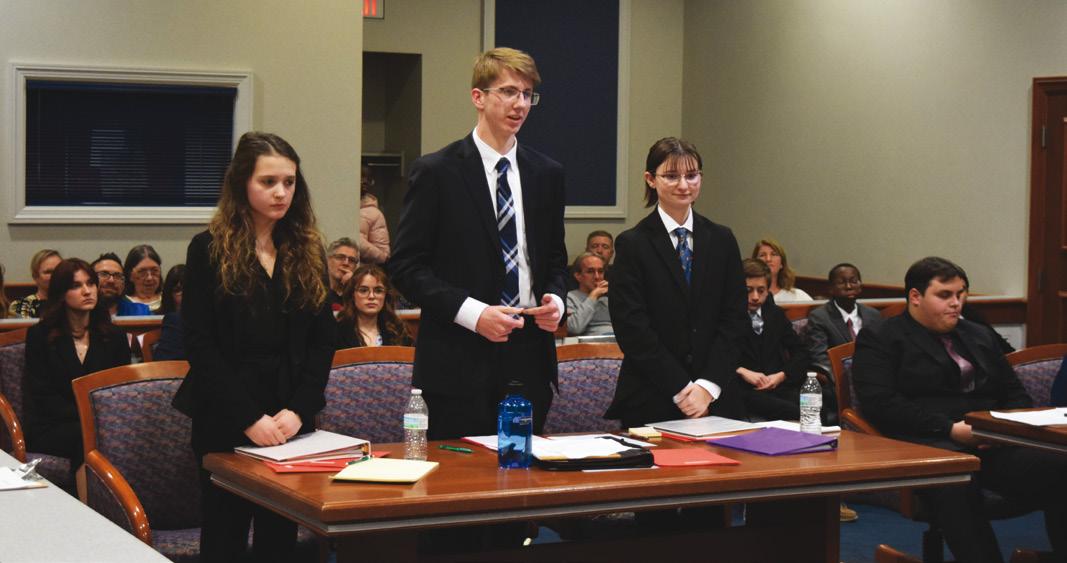
Students from Fleetwood High School’s Mock Trial team introduce themselves to Presiding Judge MDJ Eric Taylor before they begin their prosecution against Bethlehem Catholic High School.
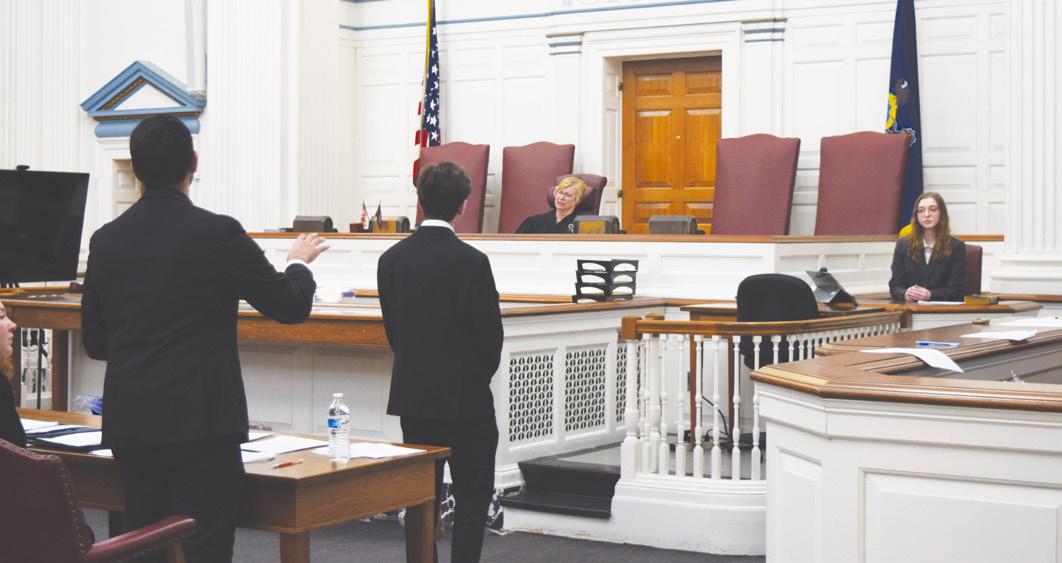
Wyoming Seminary, of District 2, and Nazareth Area High School, of District 1, compete in Regionals, which was held on February 22 in Courtroom 5A of the Berks County Courthouse.
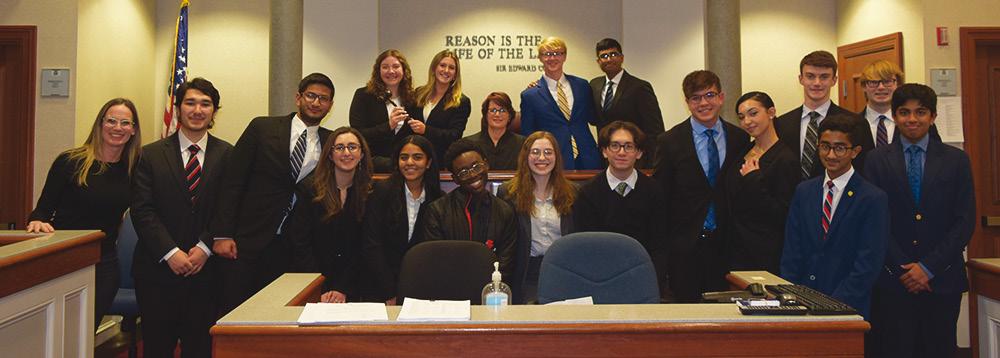
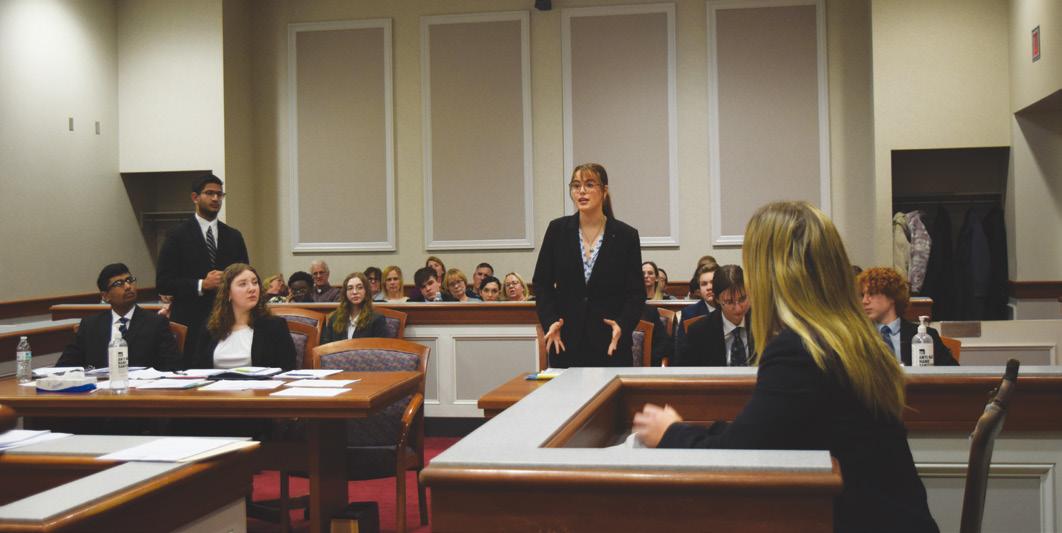
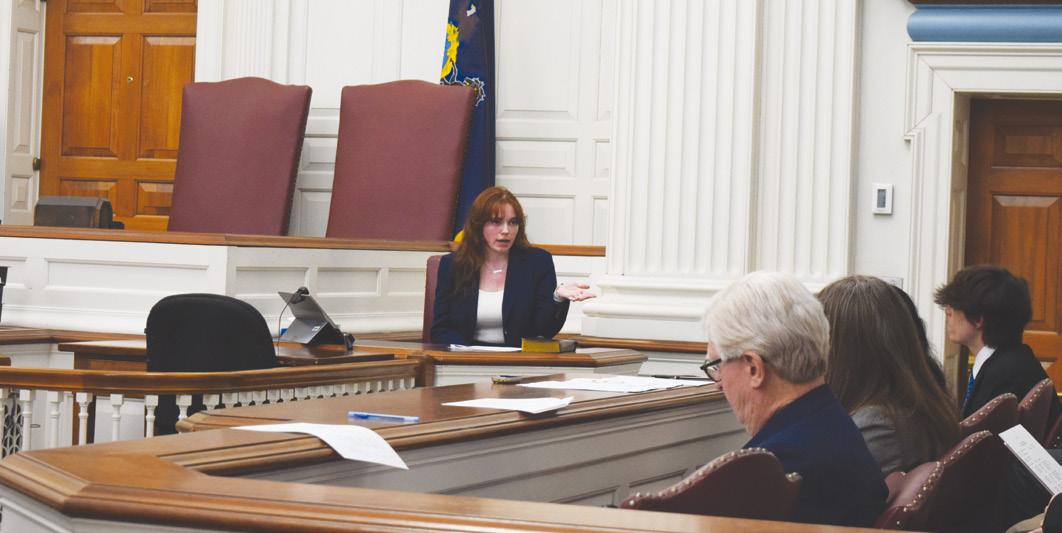
Nazareth Area High School and Fleetwood Area High School compete in the Region 5 District 1 Finals on February 15.
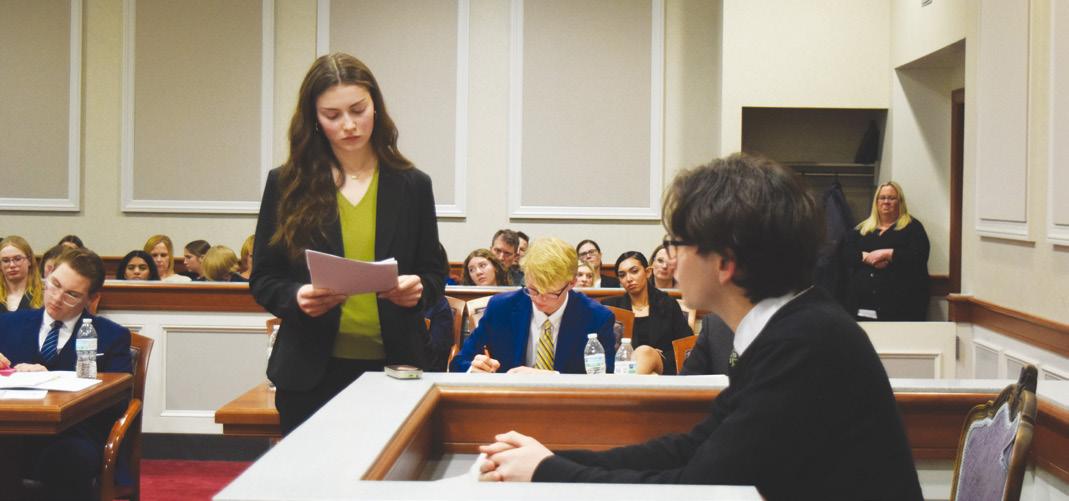
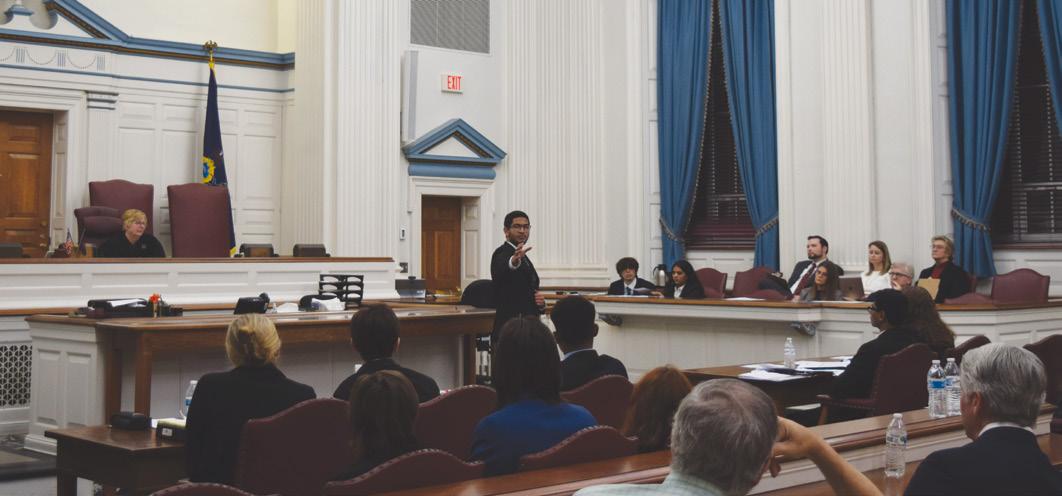

By Donald F. Smith, Jr., Esquire
Only one Berks County attorney has ever been elected chair of the Pennsylvania Bar Association’s legislative body, the House of Delegates.
Whereas, four Berks attorneys have served as PBA’s president. While being its president may be a greater time commitment, one can argue that the House chair, presiding over a session with more than 300 delegates in attendance, requires more: diplomatic acumen, open to hear all viewpoints, cool temperament, and the ability to think quickly under pressure.
Such attributes explain James W. Stoudt achieving the distinction. He served as Chair from 1973 to 1975. As the late Judge Calvin E. Smith noted in his Berks County Bench and Bar, A Commentary (1980), Jim was “calm, competent, able.” Jerome E. Bogutz, late of Philadelphia and a PBA past president, once described Jim as “an elegant and effective bar leader, statesman and friend to all.”
James W. Stoudt became a member of the bar in 1939 after graduating from Amherst College and then the University of Michigan Law School. He joined what was to become the Reading law firm of Rhoda, Stoudt & Bradley.
Six years later, he was elected secretary of the Berks County Bar Association, marking the beginning of his life as a bar leader and soon becoming known

statewide. In 1949, after only being a member of the bar for ten years, he became a trustee and one of the original founders of the Pennsylvania Bar Trust Fund and Pennsylvania Bar Insurance Fund, originally established as the Pennsylvania Bar Trust.
Thereafter, his service to the Funds was uninterrupted until his death in 2002, including a term as chair from 1978 to 1990. He was named chair emeritus in 1995.
As described on the PBA website, “the Insurance Fund was established to provide
and monitor the insurance plans offered to all members of the Association and their employees. This fund was established as a separate entity and...any excess funds accumulated in the Insurance Fund” can be transferred to the Trust Fund, which was “established to provide funds to promote educational and charitable purposes associated with the legal profession and the administration of justice.”
Grants may also be provided by the Insurance Fund “for programs that are designed to help reduce the incidence of malpractice and to provide loss control programs that will help lawyers practice better…” Such funding has been received by the BCBA to purchase the projector in the Education Room, the high-definition TV and sound board for broadcasting PBI programming, and the “Meeting Owl” to allow for better interfacing between our locally produced seminars’ in-person audience with the Zoom audience. All designed to provide a better delivery of our continuing legal education, helping our members “practice better.”
In addition, from the Trust Fund, the BCBA has received funding allowing for the purchase of notebook computers and remote printers for our community outreach programming, such as Wills for Heroes. Over many years, Past President Jeffrey Franklin has taken on the responsibility of making the requests that have resulted in multiple grants from both Funds, ranging in amounts from $4,000 to almost $9,000.
Conventional wisdom says, “Don’t put all your eggs in one basket.” MLM thinks otherwise.

Lawyers’ professional liability insurance is all we do. As a result of doing one thing, we do that one thing well. Proud Partnership Sponsor of the 2024 Bench-Bar Conference
At MLM “here today, here tomorrow” is more than just a motto and our financial strength is your best defense.

Get a Quote Today! Jody Campbell 215-872-8026
jcampbell@mlmins.com www.mlmins.com
Protecting Your Practice is Our Policy.®
Such financial support for our Bar Association and Pennsylvania’s other local bar associations is part of the legacy of Jim Stoudt.
His legacy runs even deeper. BCBA Past President Heidi B. Masano served on the Funds’ board from 2011 to 2019, chairing it for the last two years of her term. She told me, “As you serve on the board, you come to know Jim’s legacy. His influence is still felt in helping to answer questions that came up in our discussions.” Another Past BCBA President, Berks County Judge Jill M. Scheidt, currently sits on the board.
While being a leader within the PBA, Jim was also a local bar leader. He served as bar president from 1970-1971 and represented Berks and other counties in Zone 2 as a member of the PBA’s Board of Governors.
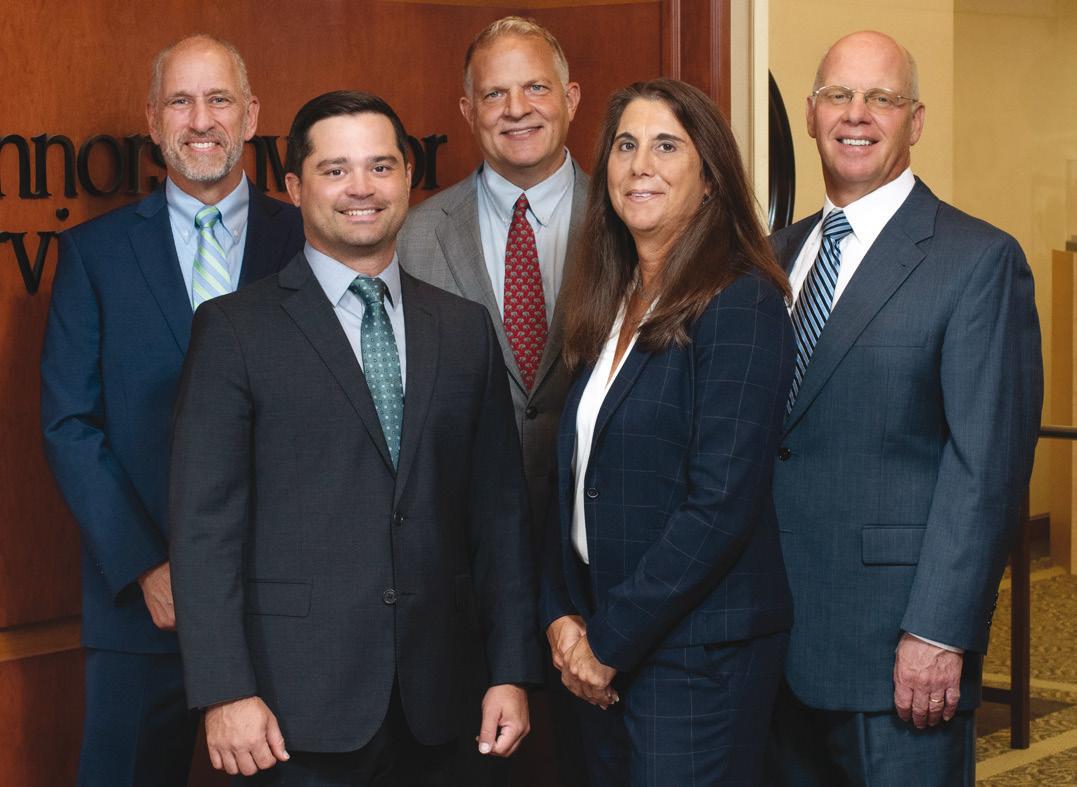
Our long-term perspective and counseled insight provide the confidence investors need in today’s challenging environment. As a registered investment advisor, our fiduciary responsibility is only to you and the best interests of your investments.
Integrity, Service, Performance. 610-376-7418 • connorsinvestor.com

He continued to be involved on the state level beyond his role with the Funds and the House of Delegates. In 1984, Jim was one of the original Life Fellows, creating the Pennsylvania Bar Foundation, the PBA’s charitable arm dedicated to public outreach educational programs and access to justice. He even served as its board chair from 1994 to 2001.
The Pennsylvania Bar News issue of April 1, 2024 featured, with a cover story, the fact that the Bar Foundation is currently celebrating its 40th Anniversary. The article notes, “the James W. Stoudt Memorial Scholarship Fund of the Pennsylvania Bar Foundation is a lasting testament to one of the Pennsylvania Bar’s steadfast supporters: the late James W. Stoudt.”
The article continues, “in memory of Jim’s contributions to the Foundation and to the Bar community as a whole, and with the support of Jim’s family, the
Continued on next page
Continued from page 11

Foundation created the James W. Stoudt Memorial Law School Scholarship Fund of the Pennsylvania Bar Foundation. Supported by the proceeds of ‘Foundation of Treasures,’ the Foundation’s annual silent auction, the…Fund provides three $3,000 scholarships annually, two of which are specifically designated to support minority law students, to candidates attending any one of nine accredited law schools serving Pennsylvania.”
They represent an enduring remembrance of an “elegant and effective bar leader.”
A year after Jim’s death at the age of 87, the Berks County Bar Association held a memorial service for him in Courtroom 5A. A transcript of the service appears in the July 21, 2005 issue of the Berks County Law Journal (Volume 97). Jim’s son, Geoffrey M. Stoudt, Esquire, spoke in memory of his father, recalling he “had three loves in his life: his family, the lake, which was his refuge, and the law, and it was the law that defined him.
“He was everything you would hope a lawyer would be. He was honest, intelligent, articulate, loyal, a terrific advocate, and a trusted counselor. How did all this happen? Well, with my dad, I think it happened because of three things: determination, hard work, and brains.”
Geoff continued: “He loved the law. It was a passion with him. He loved lawyers. He loved talking to lawyers. He looked like a lawyer. He dressed like a lawyer. He thought like a lawyer. He probably dreamed like a lawyer, whatever lawyers dream. This

was his domain, where we are today. This is what he loved, because in the end, he was a trial lawyer.”
Jim Stoudt was a very successful trial lawyer, practicing insurance defense law. He was honored with membership in the American College of Trial Lawyers. Geoff described his father’s courtroom approach: “He loved to battle other lawyers. He loved to match wits with them. To him, this was like a chess game. He was always trying to anticipate what people would do, and he juggled cases. In the days of the old trial list, we would appear on a Monday over here, everyone in this courtroom. It was mayhem, and he would have 15, sometimes 20, cases on the trial list, and he had them all figured out, which one was going to go. He was a master, but he was a quiet man, a gentle man. There was no bombast in him, and he treated other lawyers very well.”
Geoff followed in his father’s footsteps to Amherst, Michigan Law, and Rhoda, Stoudt & Bradley, which, following a merger, is now Kozloff Stoudt. Illustrating his dad’s love for lawyers and enjoying time with them, Geoff shared one of his “fondest memories.” It was an evening spent at Judge Ralph Body’s cabin, sometime in the early 1960s. “At the time, he was a federal judge. We all gathered. Body was there, Rhoda was there, my dad and I were there. John Bradley was there, and it was a warm summer evening. We had had dinner.
“We were sitting out on the patio sipping apple jack. Judge Body and John Rhoda had a real penchant for apple jack, which you could get only somewhere in northern Berks County. That was very powerful stuff. It was a beautiful evening, and to see these men at the top of their game talking politics and the law, well, it was enough to impress a young man, and it was probably then that I decided I was coming back to Berks County.”
While “it was the law that defined him,” Jim made time to help the greater community. As Geoff detailed at the service, his father had served as “president of the Chamber of Commerce, the Rotary Club, the Children’s Aid Society. He was chairman of the United Way and won the Doran Award. He was very active in Holy Cross Church and served in many capacities, was a trustee and chairman of the Board of Trustees.” With everything on his plate, Jim still found time to teach Sunday school every Sunday.
In a recent interview, Geoff told me his father “spent as much time doing good works for the bar and community as he did practicing law.”
No wonder he sought refuge at the lake, the lake being Eagles Mere Lake in Sullivan County. There, the family owns a Victorian summer cottage built in 1880, known as Rosewood. Grandchildren came to refer to the property as “Papa’s play land”!
But even at the lake, he was called upon to be a leader, serving for a long time as president of the Eagles Mere Lake Association. Why was Jim Stoudt so frequently chosen to serve as a leader, no matter the organization? Geoff believes it was because his father “had a unique ability to listen, entertaining everyone’s opinion, with him only speaking at the end, tying it all together, allowing the group to reach consensus.”
In 1992, the Conference of County Bar Leaders established the Gilbert Nurick Award, named after a Harrisburg lawyer who had served as a PBA president and was considered the bar’s elder statesman. The Award recognizes a PBA member “whose dedication and service to leadership and promotion of the organized bar and its activities has resulted in the enhancement of leadership for incoming bar association officers.”
After Mr. Nurick received the Award in 1992, the very next recipient was James W. Stoudt in 1993. I, along with other officers from Berks, were present in Pittsburgh for the presentation. We were honored to share in such a well-deserved recognition and, I dare say, were inspired by it. The fact he was the first recipient of the Award after Mr. Nurick speaks volumes.
Following Jim’s death in 2002, then-PBA President Timothy J. Carson was quoted in the Pennsylvania Bar News, dated November 18, 2002: “The PBA and the legal profession have lost a true and long-time friend. Jim was involved for so long in so much of what we have become as an association that it is difficult to estimate his legacy.”
Seven years before his death, members of the Eagles Mere Lake Association demonstrated their love and deep respect for Jim by recognizing him with a special gathering in the summer of 1995. Geoff was asked to speak. After making a few remarks, he shared this poem he had written for the occasion. (See right column.)
Geoff concluded his memorial service remarks by saying “as a son, there wasn’t a day in my life I wasn’t proud of him.”
And so much to be proud of! Gentleman Jim’s impact goes well beyond being Berks’ one “House Chair,” and it continues to resonate today.

The Osprey dives, the Loon calls – babies and all Sun sets low, moon on the rise, Deer like statues with albino there too.
A plunge in the lake, water like velvet
A high heaven on Earth beckons to him. Mornings on the lake, misty or clear
Diamonds on the surface a recurrent thrill; Wind from the south sure to bring rain, ’Tis Houckie’s prophecy again
Out in the Old Town with trout running deep, use the old lure, Rapala for sure, hope for the hit and mono to hold.
A trout leaps high, all silver, red, green and gold; Boated by Jim, to release or to hold?
Saute’ in Chablis or release to swim free?
Life’s Little Torments!
Quiet and thoughtful with insight to spare, Patience a virtue our Gentleman Jim,
But don’t lose that fish or expletives roar forth, what a rude jolt, but human he is!
A friend to all, new friends to make, old friends commune on good deeds to be done; service above self for generations to come.
Defender of the faith, flora and fauna too, Protector of all creatures, large or small –But not squirrel-nutkin!
My cottage his home – the devil you say! The hell with the ferret, those trees a forest make. Jack’s in the pulpit with orchids to find, silence is golden then they’ll survive.
Geese on the wing, October flurries abound, Refuge is sought as whitecaps pour in, but a pickerel awaits and a legend is made.
Who ate that monster?
Winter comes on but Spring turns triumphant Nature’s on the move, flowers to be planted; Rosewood reopens with rockers all out and family around,
All’s right with the World Oh, how sweet it is. and so are you
Thanks for caring, Gentleman Jim!

Author’s note: I wish to thank Geoffrey M. Stoudt, Esquire, for taking time with me to reminisce about his father and for sharing the accompanying pictures. I am also grateful to Tameka L. Altadonna, the Pennsylvania Bar Association’s Governance & Foundation Manager, for her generous research efforts on our behalf.
By Joan E. London, Esquire, Kozloff Stoudt, P.C.
Esquire,
It’s a familiar scenario for local government; a developer of large-scale warehouses and distribution centers will be making a presentation at the next meeting on its proposal for a project near a highway in the community. Local social network pages light up, and word gets around to attend the meeting. Individuals who have organized against warehouse development in other communities join the fray. The room is filled with noise and emotion, even though a plan has not yet been submitted and the presentation is a concept. Once the actual plan and/or zoning application is filed, multiple hearings and/or meetings take place because of the individual residents and organizations entering appearances, crossexamining witnesses, and putting on cases of their own on alleged impacts of this type of development on traffic, infrastructure, safety, and quality of life. Public comment is a meeting night in and of itself. At the conclusion, the governing body or zoning hearing board renders a decision, and regardless of the result, the matter ends up in a lengthy, expensive court battle.
highway interchanges. Berks County is uniquely situated for this development due to the presence of Interstate 78 in the northern part of the county, and an interchange of the East-West PA Turnpike at Morgantown. This location gives ready access of less than a day’s drive to the population centers of the Middle Atlantic States.

The Municipal/Education/Real Estate/Environmental Law Section presented a CLE at the Bench Bar Conference titled “What Will the Neighbors Think? Public Input on Developments of Regional Significance.” The moderators were Joan London and Matthew Fessler, Section Co-Chairs; Keith Mooney of Barley Snyder who spoke from a developer’s perspective; Abby Jones from PennFuture, an organization that seeks to educate residents on their rights with respect to proposed land development; and Michelle Mayfield, of Hartman, Valeriano, Magovern & Lutz, who spoke from the solicitor perspective.
Changes in technology and retailing have been a main driver of large warehouse and distribution center projects. Just like in post-WWII America, consumers went from shopping in towns at smaller stores to shopping at malls; since the advent of online shopping, consumers discovered the convenience of ordering from the comfort of home and having items delivered to the door. Large retailers like Amazon and big-box stores needed larger fulfillment centers to meet these new demands. These new centers, some requiring 1 million square feet or more of warehouse space, need to be placed at strategic locations with access to
Warehouse development has become the current controversial topic in land use, just like the cell towers and intensive agricultural operations of the recent past. Like those prior locally unpopular uses, the controversy over the actual and perceived impacts on communities has garnered legislative attention, and two bills have been introduced in the General Assembly. First, House Bill 782 proposes to amend the Municipalities Planning Code to broaden the scope of the phrase “developments of regional significance” to include many of the new and more intense uses which have emerged (including warehouse projects). This bill, if it becomes law, would attach an impact study requirement. The study would include analyses of environmental, natural resource, traffic, utility, housing,
emergency services, property values, and infrastructure impacts of the proposed development, as well as other impacts which the governing body requests, as part of the planning process. Of special interest to Berks municipal governments, the new definition and enhanced impact study requirement would include projects in municipalities with a population of less than 10,000 (the majority of municipalities in Berks County), which are expected to result in the generation of 3,000 or more average daily vehicle trips, or the generation of 100 or more vehicle trips entering or exiting the development during any one-hour time period. HB 782 would change the public notice procedures for such projects and require applicants to perform not only these impact analyses but also to submit mitigation plans. HB 782 was referred to the House Local Government Committee on March 30, 2023.

tax revenue, and traffic improvements. He presented with the course materials a U.S. Chamber of Commerce study on these projects. Mr. Mooney highlighted that one of the more difficult aspects of representing developers is convincing residents of the positive impacts that warehouses bring and the work that is done to improve, rather than diminish, conditions in the area, including traffic improvements. Despite expert reports, engineer testimony, letters from PennDOT and other evidence, sometimes the residents are convinced that the warehouse will be harmful to their community, traffic, and way of life and do not acknowledge the evidence to the contrary. Abby Jones also discussed the difficulty in working with the public, namely informing the public as to the zoning process and how they can meaningfully express their concerns or object to the proposed development.
The second piece of proposed legislation is House Bill 1960. This proposed legislation would apply to “high-impact” warehouses and distribution centers. It would require these projects to obtain not only land use approvals but also would require a referendum at the next election, where voters would need to vote in favor of the project in order for it to be able to come to fruition. HB 1960 was referred to the House Local Government Committee on January 31, 2024.
The panel agreed that land use, zoning, and planning have always been based upon the balancing of the right of owners to use their land as they see fit with regulations that support community values. Currently, warehouse and distribution center projects are treated no differently than any large land development. Many zoning ordinances, however, have not been updated to account for projects of this size to allow for mitigation of impacts on the municipality’s residents. Ms. Mayfield recommended that municipalities review and update their zoning ordinances to consider districts in which these developments can best operate and the conditions that should apply. She also recommended that the Zoning Ordinance, and the Zoning Hearing Board, set forth procedures for the zoning hearings in advance of controversial applications. The panel discussed problems occurring in hearings on these matters where large numbers of residents appear in opposition to these projects. For example, in regards to granting party status, the panel agreed that determinations of party status should be made at the beginning of the first hearing. Nonparty residents should be granted the opportunity to provide comment at the end of the hearings but need to be reminded that they cannot question witnesses or present evidence. The panel also agreed that these public comments must appear in the record. These comments, however, are unsworn, and mainly statements of opinion, and should be weighed accordingly. Additionally, residents represented by an attorney need to be informed that they will not be permitted to ask their own questions at the hearings, as that is the role of their attorney.
Keith Mooney highlighted the benefits that these warehouse, logistics, and distribution center developments offer their communities and regions, including the creation of jobs, enhanced
Ms. Jones explained that PennFuture is in the process of creating a guide for the public which will educate them on the land development process and assist in participation in the land development process. This guide is now available on the PennFuture website. PennFuture has also created a model logistics facilities ordinance in response to the issue that many municipalities’ zoning ordinances have not been updated to address these warehouse projects. Her position is that these warehouses can be good for the community, but the appropriate controls for these projects must be in place. The panelists predicted that if either of the proposed bills becomes law, it may be challenged as affording too much control to the public and local government over the use of private property (e.g., giving “what the neighbors think” veto power). The bills also may be subject to challenge as to the amount of control the General Assembly should be able to exert over land development projects.
The session was attended by many seasoned practitioners with their own “war stories” of heated proceedings on unpopular projects. All agreed that opposition to new land uses is nothing new, whether the use is a warehouse, a pig farm, or a solar farm. Residents, whether they recently relocated from out of the area to enjoy Berks County’s rural settings or are lifetime residents, are passionate about preservation of the way of life that they enjoy. Property owners are equally vehement about legal and constitutionally guaranteed rights. Land use practitioners and local officials face the constant challenge of balancing the changing land use picture with both owner rights and the community’s values.
Ms. London is with the Spring Township firm Kozloff Stoudt and Mr. Fessler is with the Wyomissing firm Hartman, Valeriano, Magovern & Lutz. They are co-chairs of the Municipal/Education/ Real Estate/Environmental Law Section.

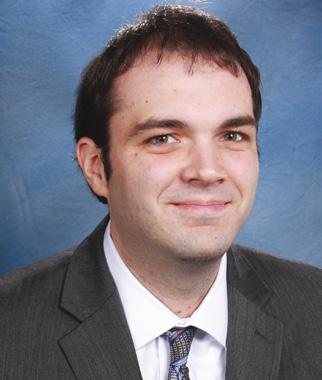

Berks County Bar Association President-elect Daniel C. Nevins is set to finish three major American races in just 13 months.
By Kori Walter
Shortly before 9 A.M. on Wednesday, April 15, Berks County Bar Association President-Elect Daniel C. Nevins walked into the DoubleTree Hotel in downtown Reading along with 200 attorneys for the start of the Bar Association’s Bench Bar Conference.
Attorneys arrive for the conference in the morning, sit in continuing legal education seminars all day, and head home following a reception shortly before the sun sets. The conference is a professional development marathon for lawyers.
Less than 48 hours before moderating criminal law seminars and mingling with fellow attorneys at the Bench Bar Conference, Nevins was competing with more than 30,000 runners from 118 countries in the 128th Boston Marathon.
Wearing race bib number 10561, Nevins crossed the finish line of the oldest annual marathon in just over three hours –3:20:31 to be exact, according to the Boston Athletic Association results.
The effects of covering 26.2 miles of Boston pavement, with some rather challenging uphill sections, at a pace of just over 7 ½ minutes per mile, could still be felt when Nevins showed up for the Bench Bar conference.
“I had some pretty deep-muscle soreness for about three or four days (after the marathon), especially my hamstrings and quads,” Nevins recalled. “I may have
been walking pretty stiffly at Bench Bar this year.”
Boston was the second of three “American major” marathons Nevins has completed. He ran the Chicago Marathon in October and is training for the New York City Marathon on Nov. 3.
“There is no better way to experience a city, its neighborhoods, and people than to run a marathon through the streets,” Nevins said. “To have the opportunity to run the three American “Majors” over a 13-month period is something I’m grateful to be able to do.”

Nevins said running the Boston Marathon had been a long-time goal given the strict qualification standards.
Nevins had to submit results from other marathons demonstrating that he had finished with a time of 3:20:00 or less. The Boston Athletic Association also warns runners that they are not guaranteed a spot at the starting line even if they met the time qualifications.
In October, Nevins completed the Chicago Marathon in just over 3 hours and 10 minutes. But he understood training for Boston would be different.
“Boston is known as a hilly course with a steady decline to start and some serious uphill portions in the meat of the race,” he noted. “On the other hand, Chicago is flat with typically cool temperatures and much more conducive to a fast time and setting personal records for many runners. So, I spent the winter training on hills to simulate course conditions for the different stages (in Boston).”
There’s one hill on the Boston race route renowned for pushing competitors to their limit: Heartbreak Hill.
It is a half-mile stretch that runners encounter between miles 20 and 21 of the marathon.
Boston Globe reporter Jerry Nason is credited with coining the hill’s nickname during the 1936 marathon, according to

Earning a race bib in the Boston Marathon is as challenging as the hilly course.
the Boston Athletic Association. The hill is where John A. Kelley, who won the marathon the previous year, caught Ellison “Tarzan” Brown when Kelley made a friendly gesture of tapping Brown on the shoulder. Brown responded by regaining the lead on the final hill and finishing first. And as Nason reported, “breaking Kelley’s heart.”
Nevins described Heartbreak Hill as a “beast” that lived up to its reputation as the most challenging part of the marathon.
“It comes when a runner’s glycogen level is low, the sun and heat are high, and the finish is still 10 kilometers away,” Nevins recalled. “Heartbreak can do a number on a runner both physically and mentally. However, the crowds in this area are going absolutely bananas and urge runners on to the summit.”
Nevins added that the spectators lining the streets set Boston apart from many other cities that host major marathons.
“The Boston Marathon crowd has a well-deserved reputation as the best in the running world,” he said. “The entire city shuts down for the day so everyone can line the streets to support each of the 30,000 athletes.”
Besides Heartbreak Hill, Nevins said the “Wellesley Scream Tunnel” – an underpass that cuts through the Wellesley College campus – is another memorable section that comes at the halfway point of the race.
Nevins also noted the famous “Right on Hereford, left on Boylston” turns before the final straightaway of the race where fans
are stacked five and six deep, providing a boost for the final 600 meters.
Getting to the starting line of a major marathon tests a runner’s discipline and dedication to training.
A standard marathon training regime is 18 weeks, and consistency for an extended period is key to preparation, Nevins said.
Generally, there’s just one day of rest per week, Nevins said, adding that diet is also critical to getting marathon runners across the finish line.
“Your diet should fuel your workouts and aid in recovery and the rebuilding of muscle,” Nevins said. “My experience has been that the heavy training makes it easy and enjoyable to maintain a healthy diet.”
On mornings he’s competing in a race, Nevins said he usually fuels up with peanut butter and jelly sandwiches, bananas, and some specialty drink mixes.
“The old adage is nothing new on race day,” he noted. “You want to be sure that your stomach is as prepared as your legs.”
The importance of preparation is one of many parallels Nevins sees between marathon training and taking a case to trial.
Like trial preparation, preparing for a competitive race requires showing up, and putting in work every day for weeks and months leading up to the main event, he said.
Preparation helps when the unexpected happens as well.
“Like an adverse pre-trial ruling or a runaway witness, a pre-race injury or illness could derail your progress,” Nevins said. “Dealing with a setback and making adjustments are key. When the big day comes, there is no reason to be nervous. You can trust your preparation, both mental and physical.”
Nevins, who has practiced criminal law for nearly two decades and is a principal in the Reading firm Nevins & McAllister, has no doubt that training for and competing major marathons has helped him become a better lawyer.
“I find that training for a goal race helps organize my day,” he said. “I’m an early morning runner, so I can use the

Frequent running partner and wife, Jennifer, is familiar with the Boston Marathon starting line. She’s competed in the race twice.
time for some mental prep for that day’s hearings or client appointments.”
Nevins had one other advantage in preparing for his first Boston Marathon.
His wife, Jennifer, is an attorney at Stevens & Lee in Reading and a frequent running partner. She has raced the Boston Marathon twice.
“We love to talk training and race plans around the dinner table,” Nevins said.
Nevins said that like most runners, he’s always willing to offer training tips and course-specific pointers to anyone considering entering marathons.
And you don’t have to travel far if you are thinking about competing.
“The Philadelphia Marathon is a great local race held every November that I've run three times and would highly recommend, especially as a stepping stone to some of the bigger marathons,” Nevins said. “Fall marathon season is right around the corner and now is a great time to select a race and start training.”
Mr. Walter is the Berks County Bar Association Executive Director.
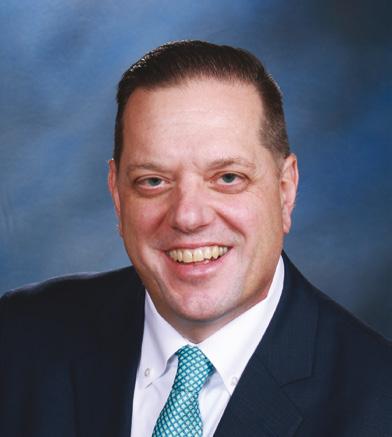
The Bar Association Wellness Committee invites members to get out and walk to relieve stress and learn about the hidden gems in the
community.

By Joseph R. Speece, III, Esquire
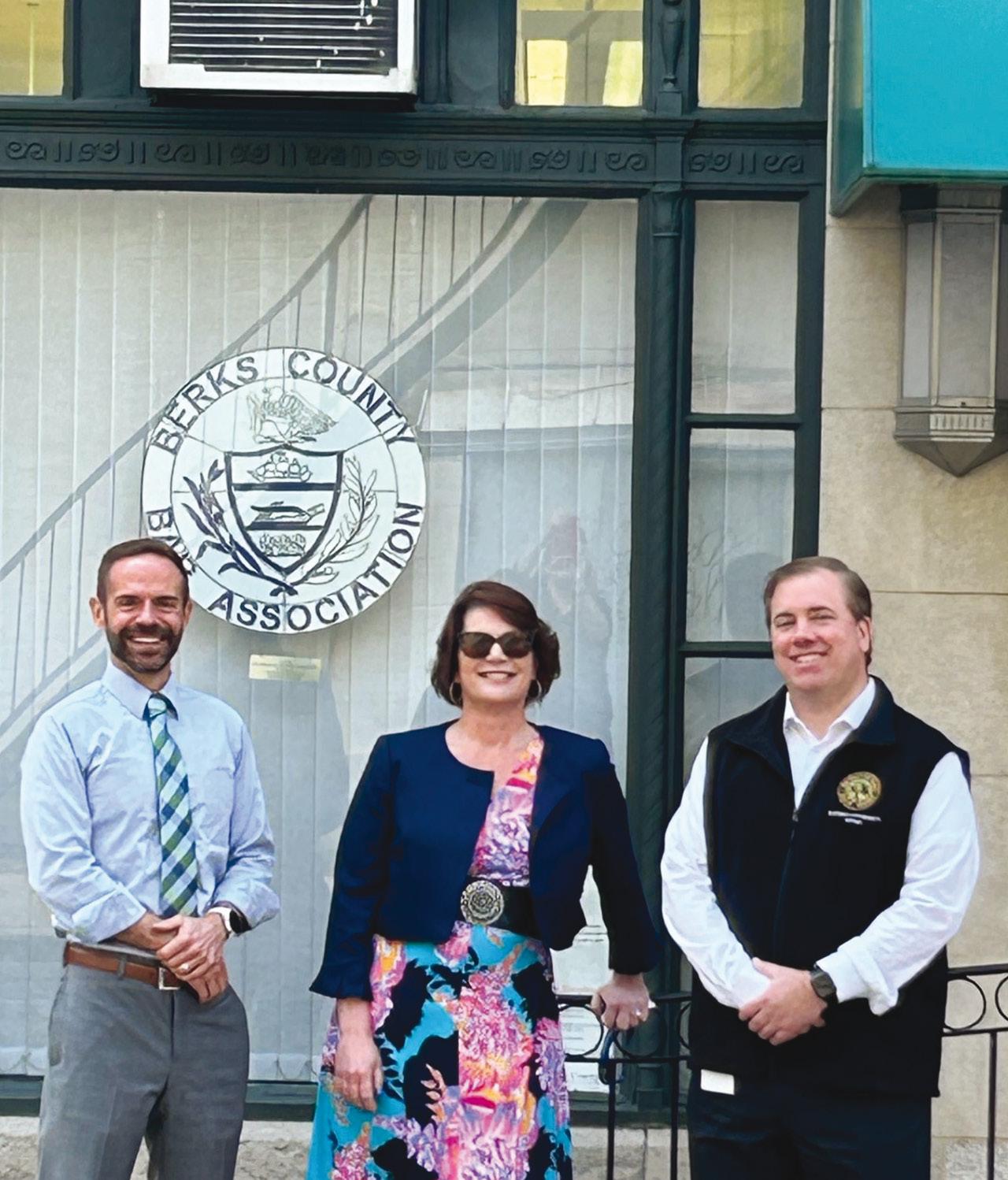
Many of the Wellness Committee’s lunch break walks start at the Berks County Bar Association. Getting ready for a recent walk are Bar Association President-Elect Daniel C. Nevins, the Hon. Jill M. Scheidt, and Wellness Committee Co-Chair Joseph R. Speece, III.
If you are in downtown Reading around noon, you may see a group of lawyers and a judge or two walking.
These lunch-hour excursions often include members of the Bar Association Wellness Committee who began at the urging – some may say prodding – of the Hon. Jill M. Scheidt shortly after she was installed as a judge in January.
Lasting about 45 minutes, the walks have fostered camaraderie among members and have been a powerful wellness tool for rejuvenating and refocusing for the remainder of what are frequently stressful afternoons.
The benefits of escaping the confines of our offices, cars, and windowless courtrooms to get in some exercise in the fresh air and unique urban surroundings are well documented.
Unfortunately, too many of us are over-extended at other times of the day to simply take time for personal wellness. Many are also distracted by the demands of our jobs and our families. We need to break out of our cloistered office work environments and get out into our community more often.
In addition to relieving some of our work-related stress, our group has discovered a few of Reading’s hidden charms from the present, historic in nature, and looking to the future.
On a recent walk, we briskly covered the area between the Berks Bar Building, our usual starting point, and City Park at the east end of Penn Street.
At the high point of Penn Street stands the Volunteer Firefighter’s Memorial. Erected in 1901, this monument honors those who dedicated themselves to battling blazes, starting with the formation of volunteer bucket brigades in the 18th Century.
Reading has always been proud of its volunteer heroes, explaining the prominent position the Firefighter’s Memorial has among the various monuments and statues in City Park. Numerous inscriptions and plaques have been added to the memorial as new fire companies were created as the city’s population grew.
Rainbow Volunteer Company No. 1 was the city’s first firefighting brigade, established on St. Patrick’s Day 1773. According to Reading Fire Department lore, this fire company got its name when a rainbow appeared in the eastern sky following a spring thunderstorm. The rainbow appeared in the middle of a boisterous debate about what to name the new station.
The Rainbow Fire Station is still at Eighth and Court streets where it has stood since 1870, just two blocks from the Bar Association building.
Continuing down Perkiomen Avenue to the east, our group encountered another memorial to Reading’s distinguished heroes, the Ringgold Light Artillery statute. This monument pays tribute to the volunteer soldiers from Reading and Berks who were among the “First Defenders,” responding to President Abraham Lincoln’s call to defend the nation’s capital at the outbreak of the Civil War.
It should be noted that the company is also recognized on a plaque inside the United States Capitol building along with several other companies listed as first responders, who temporarily slept inside the Capitol upon their arrival to Washington.
These are just a few of the historic sights available within a short walk to downtown Reading, refreshing both the mind and spirit.
We have also enjoyed walking down to the Reading Area Community College (RACC) campus to stroll along the paths by the Schuylkill River, exploring the remnants of the Pennsylvania Railroad and taking in the natural beauty of the river and its foliage.
One spring day, we walked to the adjacent GoggleWorks complex and took in a wonderful mural designed, painted, and installed by local artists.
The mural is a microcosm of Reading and Berks County
Continued on next page
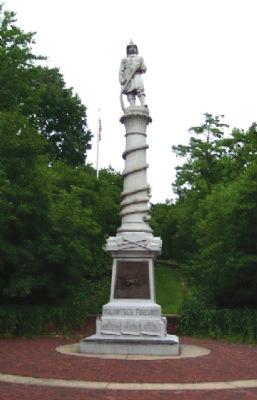


Swanona At Historic Centre Park 606 North Fifth Street, Suite 7 P.O. Box 1339
Reading, Pennsylvania 19603
Tel: 610.378.5555
Fax: 610.378.5551
drb@beanellc.com www.beanellc.com
Helping the Regulated Community Manage Environmental Risk and Solve Environmental Problems
STATEWIDE PENNSYLVANIA MATTERS NO CHARGE FOR INITIAL CONSULTATION
Representation, consultation and expert testimony in disciplinary matters and matters involving ethical issues, bar admissions and the Rules of Professional Conduct
• Judge, Court of Judicial Discipline
• Former Chairman, Judicial Conduct Board of Pennsylvania
• Former Chairman, Disciplinary Board of the Supreme Court of Pennsylvania
• Former Chairman, Continuing Legal Education Board of the Supreme Court of Pennsylvania
• Former Chairman, Supreme Court of Pennsylvania Interest on Lawyers Trust Account Board
• Former Federal Prosecutor
• Selected by his peers as one of the top 100 Super Lawyers in PA and the top 100 Super Lawyers in Philadelphia
• Named by his peers as Best Lawyers in America 2022 and 2015 Philadelphia “Lawyer of the Year” Ethics and Professional Responsibility Law and Legal Malpractice Law
111 North Sixth Street • Reading, PA 19601 (215) 751-2863
Continued from page 19

The Ringgold Light Artillery statue along Perkiomen Avenue in City Park pays tribute to the volunteer soldiers from Reading and Berks who were among the “First Defenders,” responding to President Abraham Lincoln’s call to defend the nation’s capital at the outbreak of the Civil War.
history with references to notable historical figures and significant events.
It contains a veritable “Where’s Waldo” of fun facts and images to be discovered and revealed. There is a QR code that links to a webpage containing a key to the numerous items to be uncovered in the mural, making this art a truly fun and interactive learning experience.
It has also been intriguing to encounter the City of Reading in its current state. If you look closely, you can often find small clues relating to a bygone era when the city bustled.
A great example is in the various churches that are operating, occasionally not as they were originally founded. Or in office buildings of corporations converted to colleges and centers of learning, such as the Alvernia’s College Towne Center.
Most recently in the headlines is the Gateway building, home to federal offices and courtrooms of the Hon. Jeffrey Schmehl, a judge for the U.S. District Court for the Eastern District of Pennsylvania, and the Hon. Patricia M. Mayer, U.S. Bankruptcy Court judge for the Eastern District of Pennsylvania.
Readers of the Philadelphia Inquirer and viewers of Philadelphia evening newscasts may have caught glimpses of the building, which was the site of former Philadelphia union boss John Doughtery’s extortion trial this spring.
The five-story low-rise at 201 Penn Street was built to serve as the regional offices of Aetna Insurance. A reflective statue named “The River Speaks” stands near the entrance.
These buildings are reminders that what seems permanent may not be so, and that the future of these spaces when repurposed can be positive and community centered.
The Wellness Committee invites all bar members and judges to join us for midday walks.
If there are enough members interested in walking, we can consider locations other than downtown Reading. Among the possible walking routes would be in Centre Park, just south of Charles Evans Cemetery, to take in the Victorian and Edwardian beauty of the homes and mansions along Centre Avenue.
Centre Park itself is being reconstituted and should be a wonderful oasis for our walks and allow for pleasant discussion viewing both manmade and natural beauty of the neighborhood.
Additionally, a mural walk in and around West Reading would be a delightful midday adventure as well.
Our hope is that you would consider getting outside this summer and experiencing our community, enriching yourself with more knowledge about local history, and taking a muchneeded break from your daily grind.
These walks will be beneficial for everyone personally and professionally and allow us to be seen out in the community as active participants in our civic life.
With your help, the Wellness Committee aspires to make this a recurring column.
We’d love you to share bits of interesting information uncovered during these walks in hopes of encouraging and enlightening our members about the positive assets in the community where we all work.
All you need is a pair of comfortable shoes.
If you’d like to be part of the walking group or if you’d like to submit an article about the interesting features and experiences in your neighborhood, e-mail me at jspeece@ berkspa.gov or Dan Nevins at nevins@enmlaw.com.
Be well and get walking.
Mr. Speece is Co-Chair of the Berks County Bar Association Wellness Committee and an assistant district attorney.
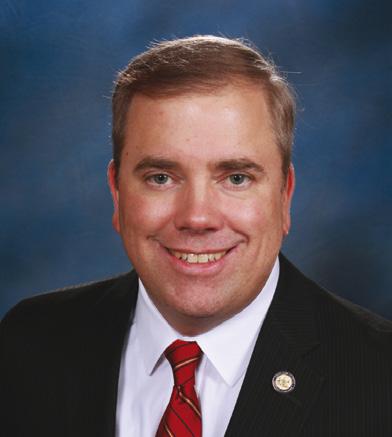

“If you want an easy process working directly with the very best, call the Erics. Their knowledge of the local market is unparalleled, and they put your needs first every step of the way to get you the greatest value and terms.”
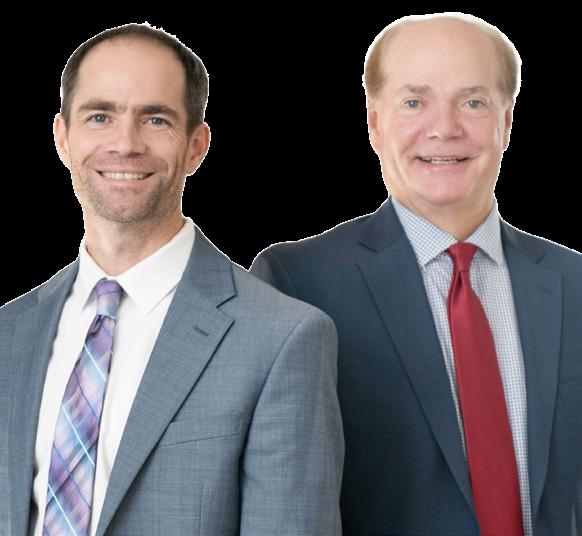

You know the importance of having an advisor you can trust. And so do we.
For the biggest investment of your lifetime, your experience is just as important as your agent’s. Over 40+ combined years in Berks real estate, the Eric Miller Team has delivered uncompromising honesty, integrity, and attention to give each customer the experience they deserve.
They’ve mastered a blend of savvy negotiation, strategic problem-solving, and impactful marketing, with a knowledge of the area and market that’s unmatched as true Berks natives and lifelong residents. They join less than 0.5% of Re/Max agents worldwide in the Circle of Legends, with Hall of Fame and Lifetime Achievement status and over $680 million sold.


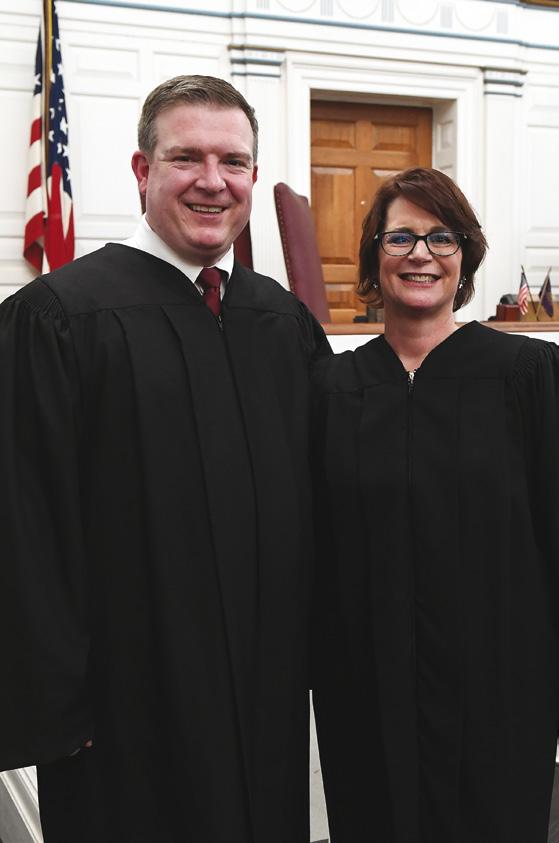
On January 4, Jill M. Scheidt and the Justin D. Bodor ascended to the bench of the Berks County Court of Common Pleas after securing their positions in the past November general election. The installation ceremony featured remarks from mentors of Judge Scheidt and Judge Bodor as well as family members who supported them through every step of the journey. The Bar Association is honored to have two of our past presidents (Scheidt in 2011, Bodor in 2021) join the bench.
Afterwards, members of the bench and bar, Judge Scheidt, Judge Bodor, and their families and friends kept the celebration going at the Bar Association building where everyone congratulated the new judges and wished them the best of luck on this next chapter in their lives.
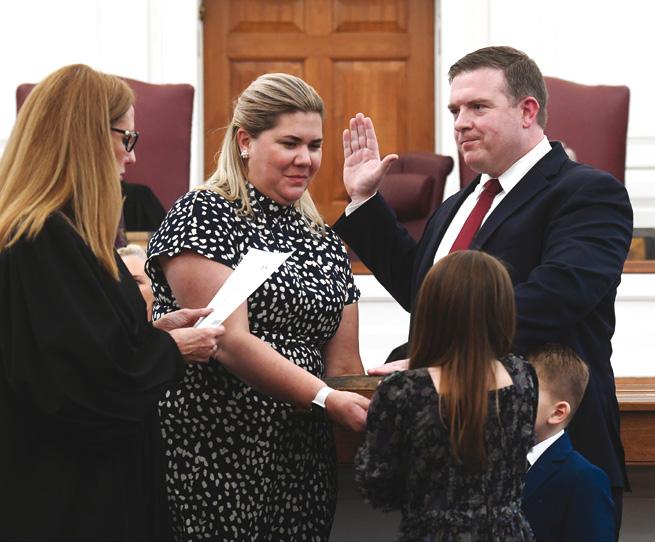
As his wife and children hold the Bible, Judge Bodor takes the Oath of Office, which was administered by President Judge M. Theresa Johnson whose courtroom Judge Bodor was assigned to while he worked in the Berks County District Attorney’s Office.

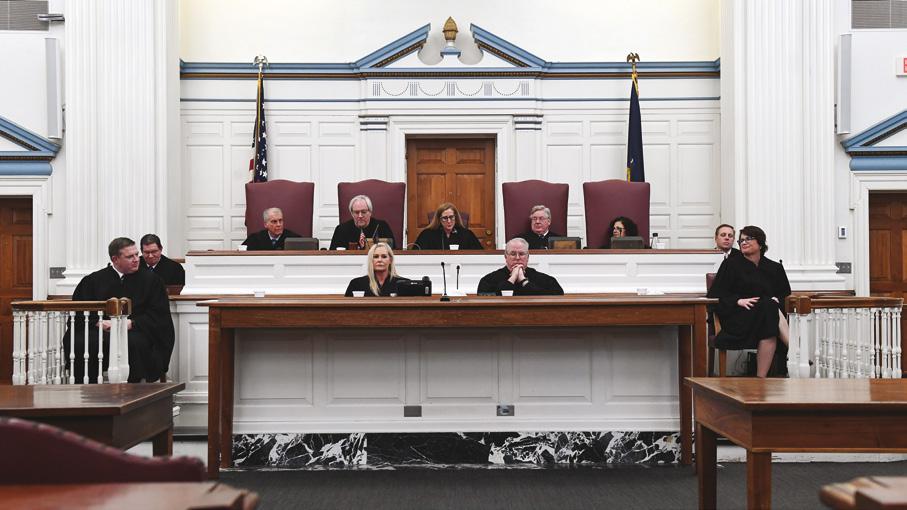
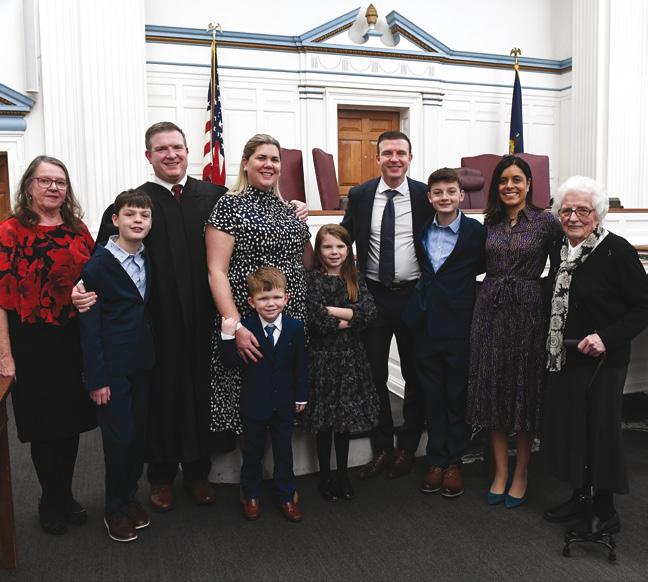

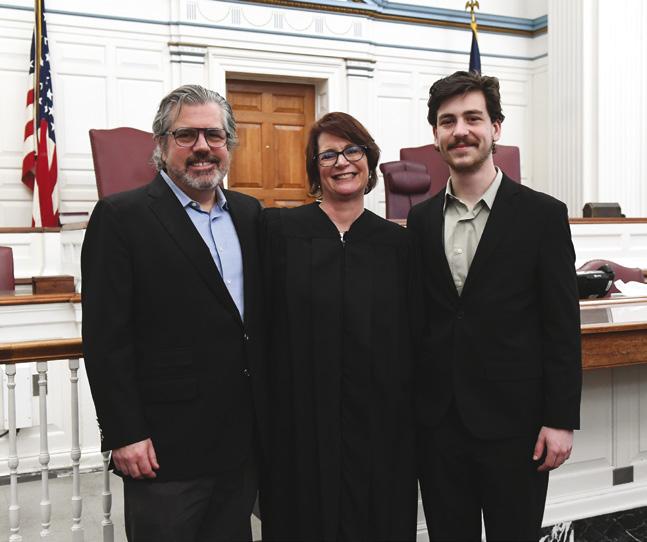


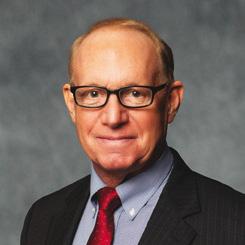


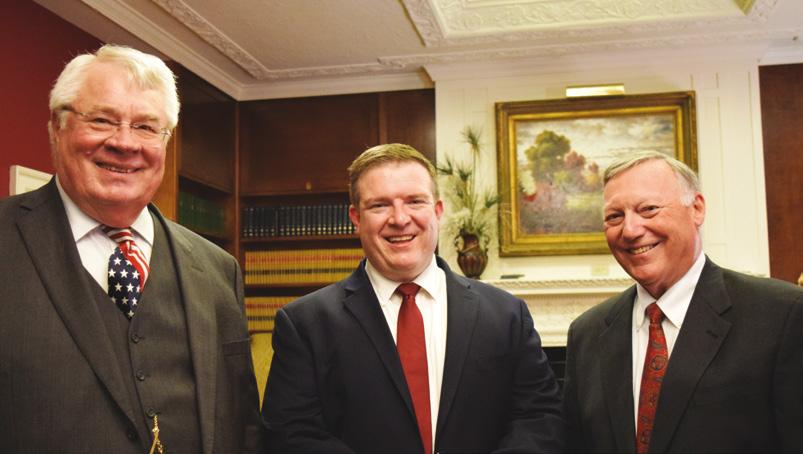
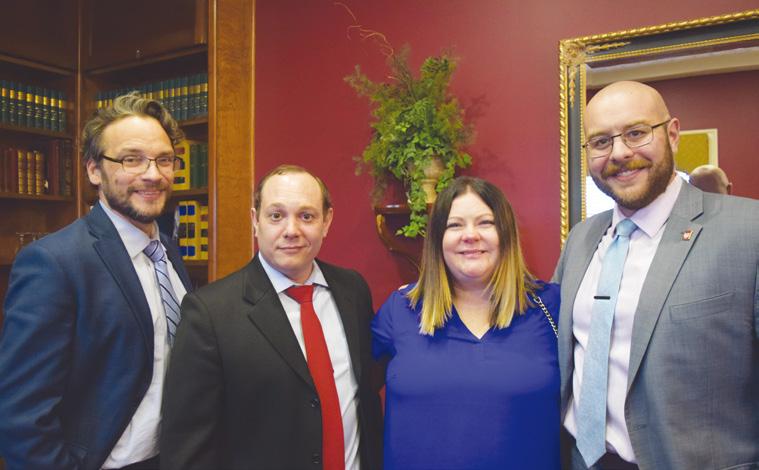
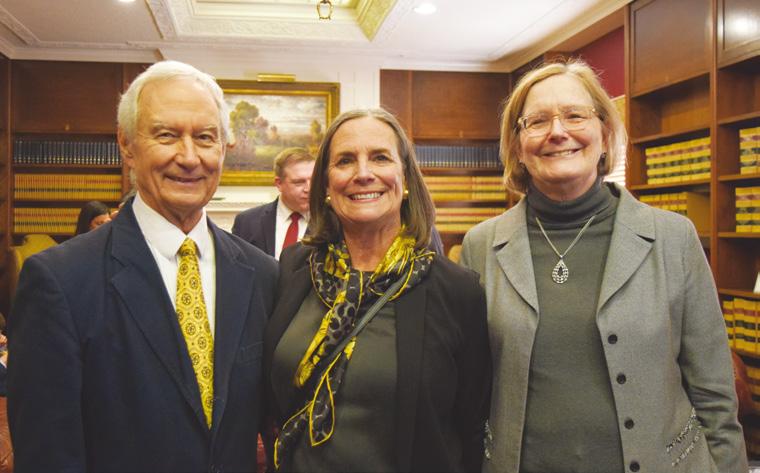
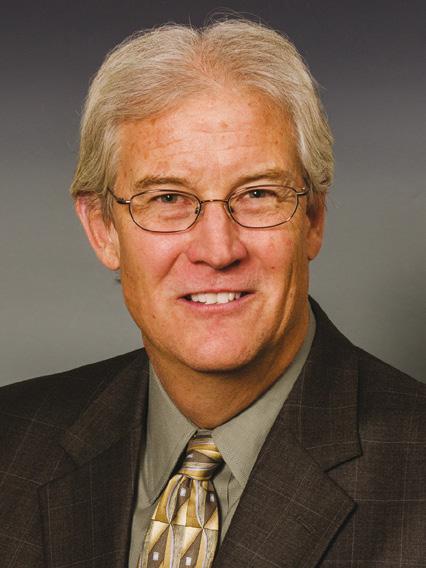
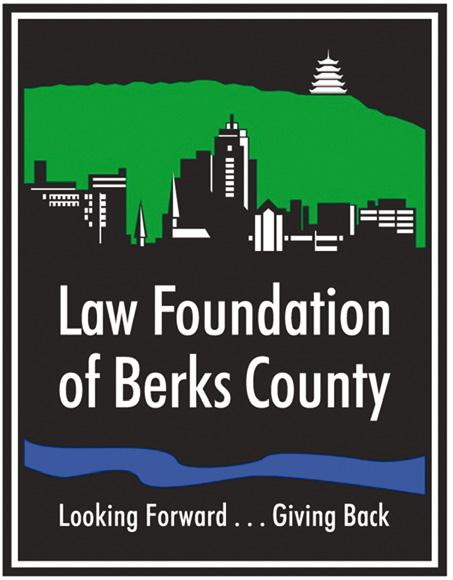
Thank you to all the Law Foundation Trustees, Bar Association board of directors and members, and supporters in the Berks County community for making the 2023 Annual Campaign a tremendous success. More than 60 donors contributed over $15,000 this year. Please know your incredible generosity is making a significant and lasting difference right here in Berks County as the Law Foundation has been able to make a positive difference for victims of domestic violence and discrimination, help foster care children in need of advocates, and assist local youth participating in public service projects and developing their athletic, artistic, and academic talents. Because of our continued efforts, the Law Foundation has been able to offer support to various community organizations, including CASA Berks County, the Community Justice Project, and the Children’s Alliance Center. Again, thank you to everyone who donated to the 2023 Annual Campaign.
Bridge Builder Society ($1000 or more)
William R. Blumer
Barbara J. Kline,
(In memory of Sidney D. Kline, Jr.)
Paul L. Marrella
Juris Society ($500 to $999)
John & Cathy Badal
Karen H. Cook
Ronald Finck
Edwin Kershner
Heidi M. Masano
Kenneth Millman
Mr. & Mrs. Eugene Orlando
Gabriela G. Raful
Donald F. Smith, Jr.,
(In memory of Past President James M. Potter)
James M. Snyder
Riverfront Federal Credit Union
President Society ($250 to $499)
Franki Aitken
Merle & Wendy Dunkelberger,
(In memory of Daniel Birnhak, Esquire)
Suzanne & Brian Engelhardt
Daniel & Ellen Huyett

Howard & JoAnn Lightman,
(In memory of the Hon. Arthur Ed Saylor)
Frederick R. Mogel
William Morgan
Daryl F. Moyer
Daniel & Jennifer Nevins
Chuck Phillips
William F. Roberts
The Honorable Jill M. Scheidt
Deborah A. Sottosanti
The Honorable Jeffrey Sprecher
Sodomsky & Nigrini, LLC
Stanshine & Sigal, PC
Partner Society ($100 to $249)
The Honorable A. Joseph Antanavage
Jana Barnett
The Honorable Patrick T. Barrett
Daniel & Dee Bausher, (In memory of Richard A. Bausher)
The Honorable Justin D. Bodor & Jessica Bodor
Eden R. Bucher
Mark S. Caltagirone
Nikolas D. Capitano
Stuart Crichton & Rosalynda Michetti
Pamela DeMartino
Jeff & Lori Elliott
Daniel Emkey
Susan E. B. Frankowski, (In memory of Leon Ehrlich)
Thomas & Beth Kohl
David M. Kozloff, (In memory of Past President James M. Potter)
Chris Kraras
Joan E. London & Walter M. Diener, Jr.
Paul R. Ober
Suzanne Palmer
Jesse L. Pleet
Peter & Mary Schuchman
Edwin L. Stock
Curran Estate & Elder Law PC
Associate Society ($50 to $99)
Bonnie Hartman
Charles & Alisa Hobart
America Nieves-Febres
Sharon Scullin
Michael G. Wolfe
Members once again celebrated the start of NCAA’s March Madness at The Works in Wyomissing on March 22. Members discussed their favorite teams, filled out their brackets, and made their predictions while numerous games were broadcasted and enjoyed over good food and drink. Everyone had a fun afternoon filled with basketball and collegiality!

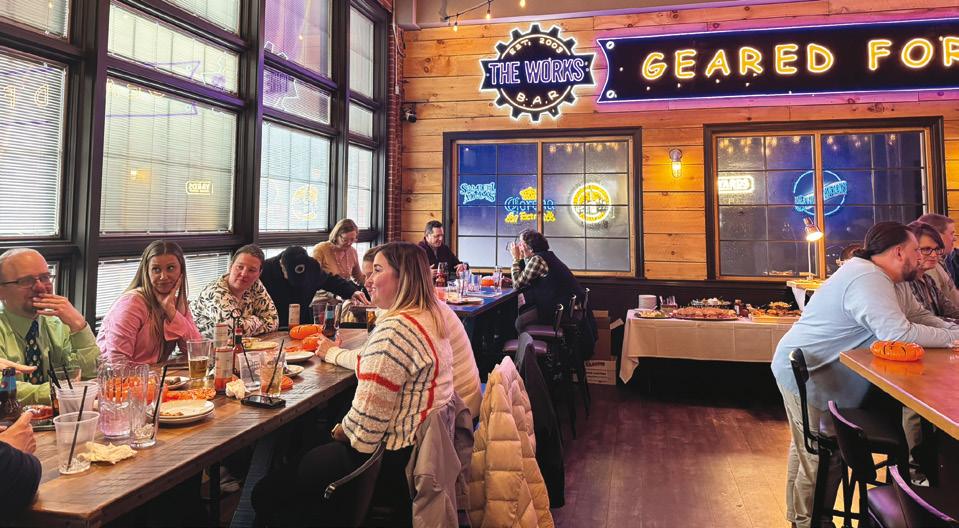
Members gather at The Works, Wyomissing for this year’s

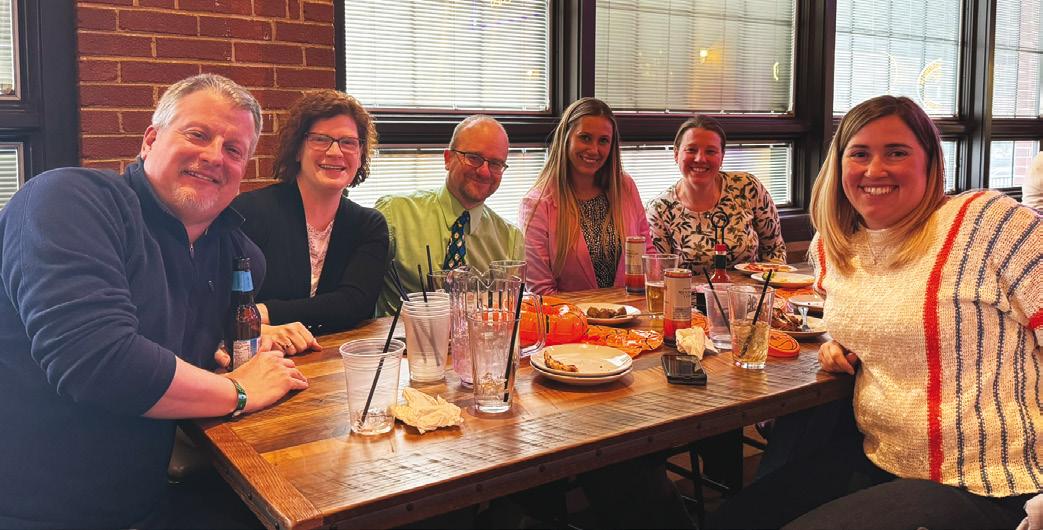



By STEVEN HALE
DReviewed
by
Donald F. Smith, Jr., Esquire
eath row inmates. Scum of the earth, right? Inhuman with no redeeming value, correct? Killing by the state is clearly justified, true?
Not really. The book Death Row Welcomes You by Steven Hale proves one can find humanity on death row.
In 2018, Hale, then a writer for the alt-weekly Nashville Scene, won a lottery to be one of a few chosen to witness the execution of Billy Ray Irick by lethal injection at Riverbend Maximum Security Institution, Tennessee’s “death house.”
The experience led Hale to begin visiting death row inmates, becoming part of “a community transcending the boundaries of death row and the ‘free world,’ a fellowship of the living and the condemned.”
As Hale writes in the book’s introduction, “this is the story of how I went to death row and found I was welcome.”
Hale introduces the reader to fourteen men condemned to die by describing the details of their crimes, some quite horrific, and the effect on the victims’ families. He also shares how these were “boys whose bodies and brains were beaten and bruised before they became the violent men who were sent to death row.”
A few examples: Abu-Ali Abdur’ Rahman – “father hanged him in a closet by tying a wet piece of leather around his penis and attaching the other end to a clothing rack”; Ed Zagorski –classmates of Ed described his father as “a complete ass drunk” who “beat the shit out of Ed” and his mother frequently abused him, once breaking “his arm in a fit of rage”; Charles Wright – the family “lived like squatters and strays, bouncing between more
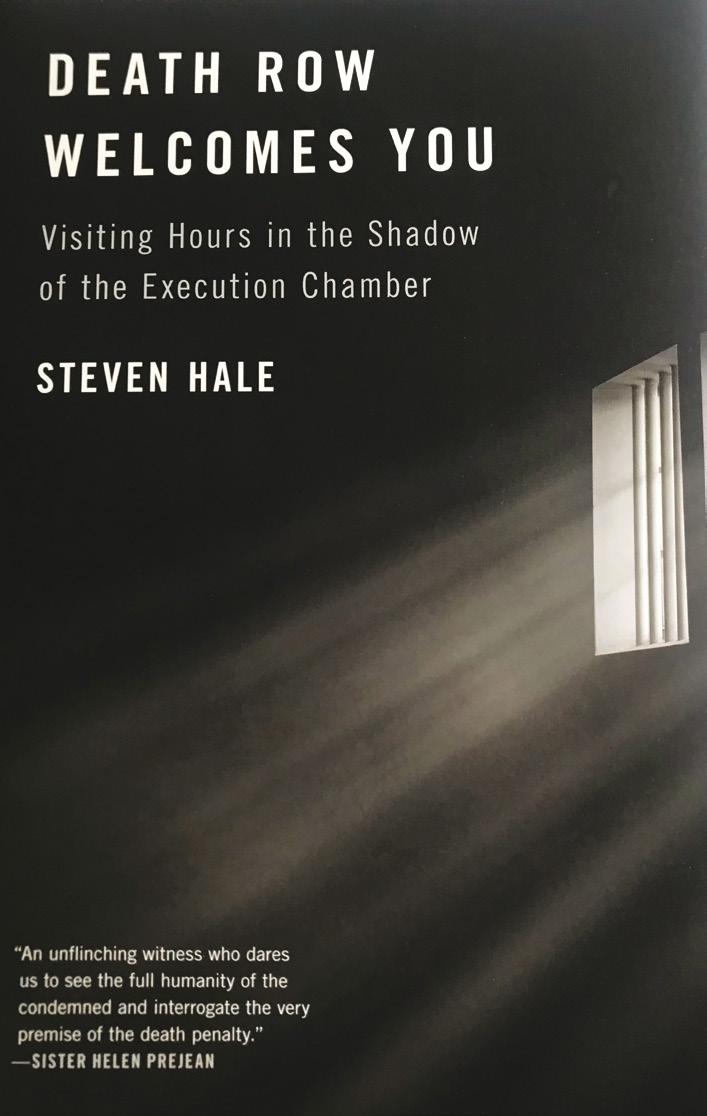
than a dozen dilapidated rental homes that protected them from neither weather nor vermin” and a mother who disappeared for days at a time, forcing Charles to “dig food out of dumpsters or steal from stores”; and Stephen West – tortured by his mother by her “withholding food and even making him sit naked in front of their house in the snow as punishment.”
The author sums it up. “I’d spent enough time with the documentation of their lives to know that their stories were nesting dolls of trauma and pain.”
But change is possible. Hale writes of one fellow-visitor’s reaction upon visiting death row for the first time. “He met men he previously would have simply called murderers. And they were murderers, of course. But as he sat with them, he realized that was a lie by omission… They were sitting unshackled before him, looking into his eyes. They even seemed to care about him. He felt destabilized in their presence, not because they were menacing but because they were not.”
Hale describes a caring community. There is Terry King, waiting for his execution since 1985, assembling welcome packages for new arrivals to the unit. The care being provided to Charles Wright, who was diagnosed with prostate cancer that spread to his bones, such that in the summer of 2018 doctors predicted he had only weeks to live. Instead, David Duncan and several other inmates began nursing him, “helping him change and bathe and use the bathroom.” They hoped to keep him well enough to stay in the unit with them. Hale writes that “Duncan’s passion for the task radiated from him. He said he was just doing what God put him here to do, to serve others…”
Another regular visitor to Riverbend was Alvaro Maurique Baueneckea, a young attorney who became one of Billy Ray Irick’s “last and only close friends on earth.” Alvaro had been visiting Billy for some time prior to his execution.
Before his first visit with Billy, Alvaro recalled for Hale that he had wondered, “how does one make small talk with a man on death row?” He need not to have worried. They talked about Billy’s travels, the various jobs he had had, his painting hobby, and their mutual love of football.
At a later visit, Billy asked Alvaro what he could paint for him, and Alvaro asked that he “paint a time in his life when he had been truly happy.” So Billy painted “a shrimping boat he had worked on in the Gulf of Mexico, and Alvaro hung the painting in his office.”
Reverend Joe Ingle, “an advocate and spiritual advisor for death row inmates across the southeast” for many years, was the moving force in creating the group of visitors Hale had come to join, regularly going to Riverbend.
But Ed Zagorski’s execution “left Joe shell-shocked.” Being so “close to the machinery of death” for 35 years had finally taken its toll. Following the advice of a therapist, Joe took time away from visiting by attending Vanderbilt University baseball games and tending to his field of blueberry bushes.
On a “peaceful and therapeutic” summer day, Hale joined Joe to help pick ripe blueberries. At one point, the subject of the men on death row came up. The Reverend said, “these guys are not a danger to anybody. They’ve all been out there for thirty years. They’re totally rehabilitated. I mean, now we’re killing ’em. I mean, it’s insane.”
Clemency was denied by Tennessee’s governor, and the rehabilitated Nick was executed.
This book is about humanity overcoming inhumanity. Reading Death Row Welcomes You is an eye-opening experience, made more so by Hale’s haunting and powerfully moving storytelling. It is a page-turner.
The reader wonders, though – why does the outsider continue to visit, knowing how the visits will eventually end? One Monday night, after Hale and David Bass had visited with Terry King, David wondered if he had made a mistake in allowing himself to become so close to Terry over the years that now Terry was one of David’s best friends.
Upon reflection, they “agreed that the beauty of these unique and radical relationships was worth the trauma that was likely to result. Or at least we agreed to keep believing so.”
According to the website for Pennsylvania’s Department of Corrections, the Commonwealth has 97 men on death row. Seven were prosecuted in Berks County: Randy Haag (sentenced in 1987); Jose Busanet (1999); Richard Boxley (2000); Michael Pruitt (2005); Cletus Rivera (2008); Albert Perez (2009); and Glenn Lyons (2011).

Are they all “totally rehabilitated”? While the question is never specifically addressed by Hale, he relates a story suggesting the answer. Nick Sutton was one inmate who had changed “from a life-taker to a life-saver.” During a prison riot, five inmates, armed with knives and other weapons, surrounded a guard. Nick bravely confronted the band of non-rehabilitees and was able to escort the guard to safety.
As part of a clemency application on behalf of Nick, the guard provided his support. “I firmly believe that the inmates who tried to take me hostage intended to seriously harm, if not kill me. Nick risked his safety and well-being in order to save me from possible death. I owe my life to Nick Sutton.” He continued to share that “if Nick Sutton was released tomorrow, I would welcome him into my home and invite him to be my neighbor.”
Pennsylvania’s last execution was in 1999. Despite the moratorium established by Governor Tom Wolf and continued by Governor Josh Shapiro, death sentences are still being handed down in the Commonwealth. The most recent was decreed in Bucks County on May 24, 2023. In a 2013 law review article Justice Thomas G. Saylor quoted a colleague as commenting “that in Pennsylvania, we do not have the death penalty, rather, we have ‘death by arteriolosclerosis.’”
Near the end of the book, Terry Kline is recorded as asking, why are prosecutors and the courts so intent on “killing people to show that killing is wrong.”
After all, humanity can be found on death row.
Mr. Smith has spoken on topics of constitutional law for the Berks County Bar Association and other groups, including the Northampton County Bar Association, Albright College, Alvernia’s Seniors College, and Wyomissing Public Library.
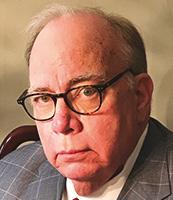


Over 200 members, presenters, and community sponsors attended the 2024 Bench Bar Conference at the Doubletree Hotel in downtown Reading on April 17. The conference featured 16 courses focused in many areas of law, giving everyone a unique and interesting course to attend, no matter their practice area. Some stand out seminars included “Get Locked and Loaded for Firearms Issues in Criminal, Estate, and Family Law Matters” and “Asking the Right Questions: Tips for Effective Cross-Examination”, which featured Berks County DA John Adams and Dauphin County DA Fran Chardo. This year’s plenary course, “Learning from the Legends of the Bar,” featured veterans attorneys Heidi B. Masano, Esquire; P. David Maynard, Esquire; John C. Speicher, Esquire; and Terry D. Weiler, Esquire with Judge Jill M. Scheidt moderating. The course featured a discussion on strategies for dealing with demanding clients, building a law practice and retaining clients in Berks County, the ethical considerations for succession planning and maintaining technical competence, and many other issues to help our members become better lawyers.
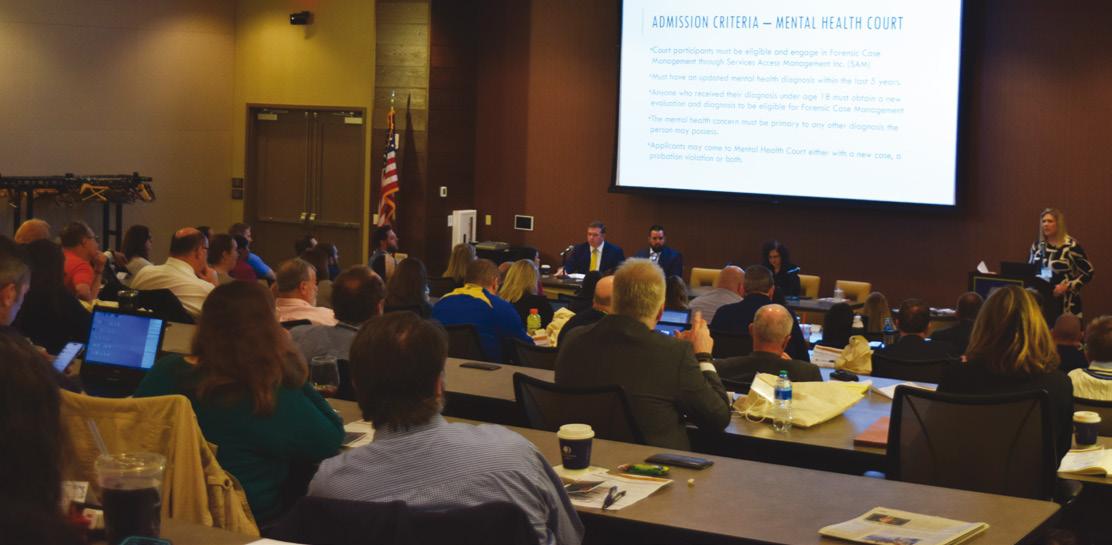
The conference kicked off with a Treatment Court Update from Judge Justin Bodor, Judge Eleni Dimitriou Geishauser, and Jessica Bodor, Assistant Chief / Treatment Court Coordinator of Berks County Adult Probation and Parole Office.
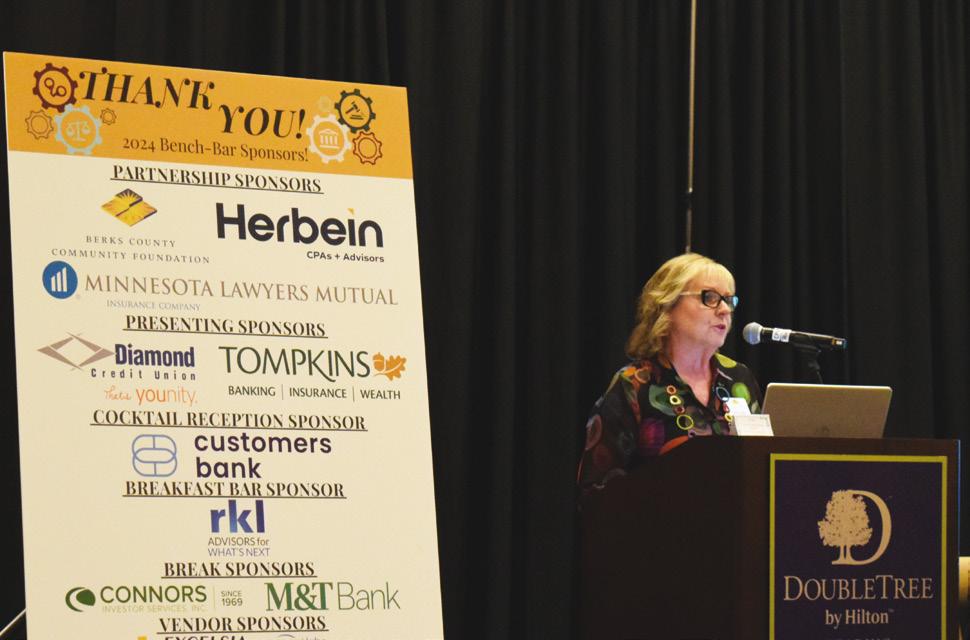
Franki Aitken, COO of the Berks County Community Foundation, shares the benefits and services they can provide for attorneys and their clients during the spring membership meeting. BCCF is a 2024 Partnership sponsor.
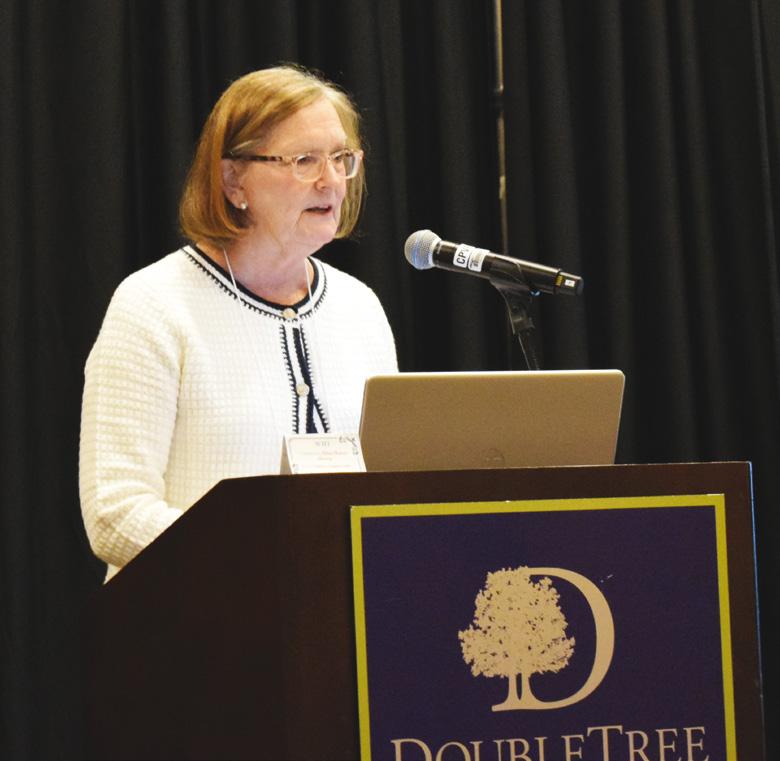
Karen Cook delivers remarks on the state of the Bar Association during the spring membership lunch meeting.
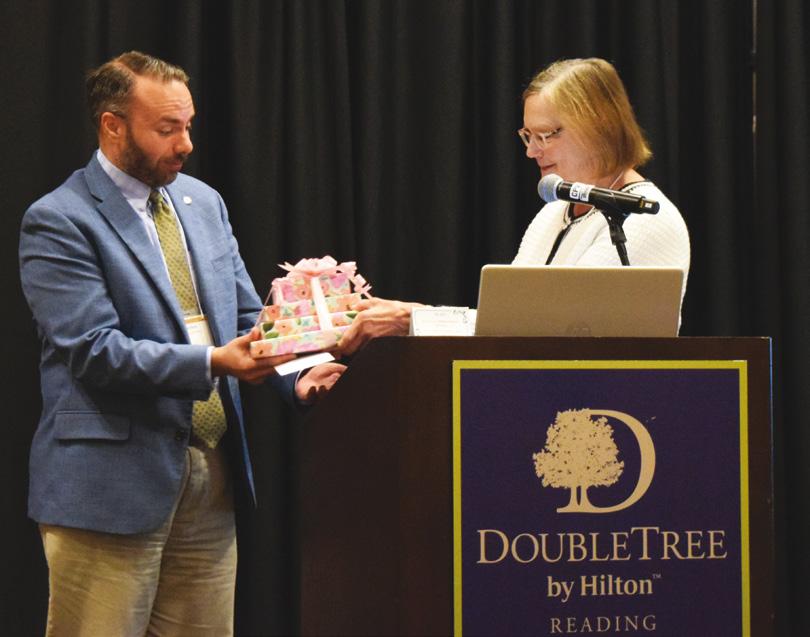
Karen Cook presents Matthew Holliday, executive director of the Pennsylvania Bar Association, with a gift of appreciation for always visiting Berks County and communicating the benefits of the PBA with our members.

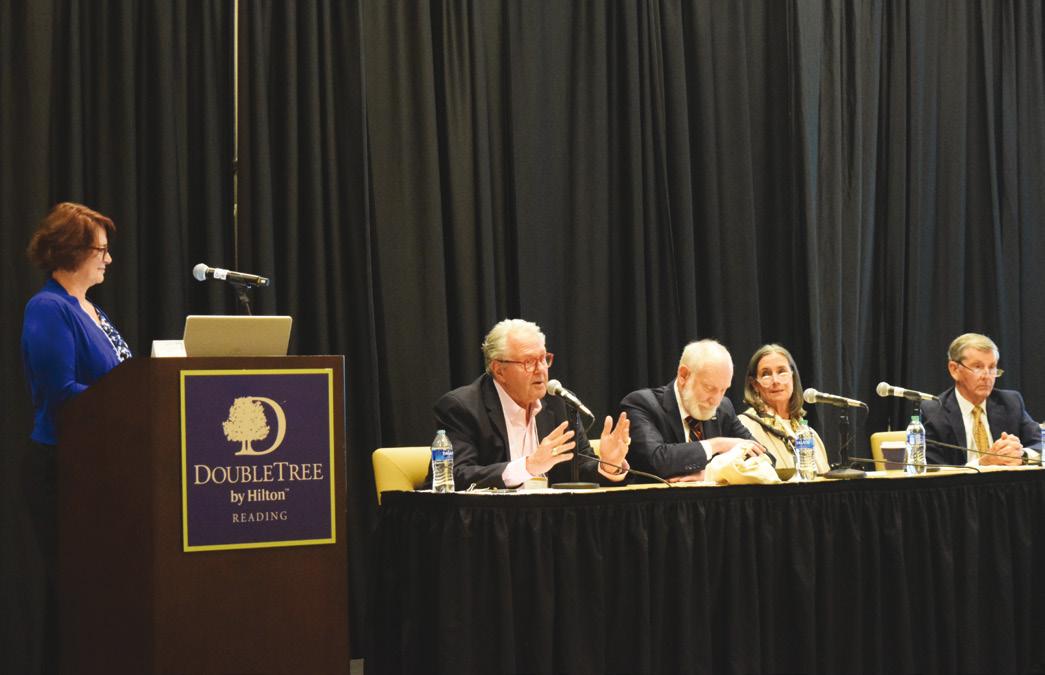
Terry Weiler, David Maynard, Heidi Masano, and John Speicher answer questions about their decades of law practice as Judge Jill Scheidt moderates this year’s plenary session, “Learning from the Legends of the Bar.”
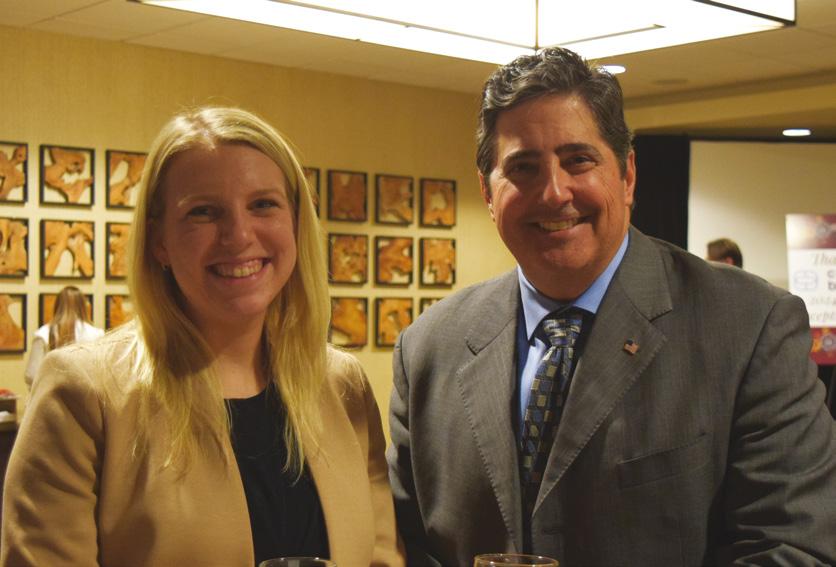
Kourtney Bernecker and Jeff Bukowski.
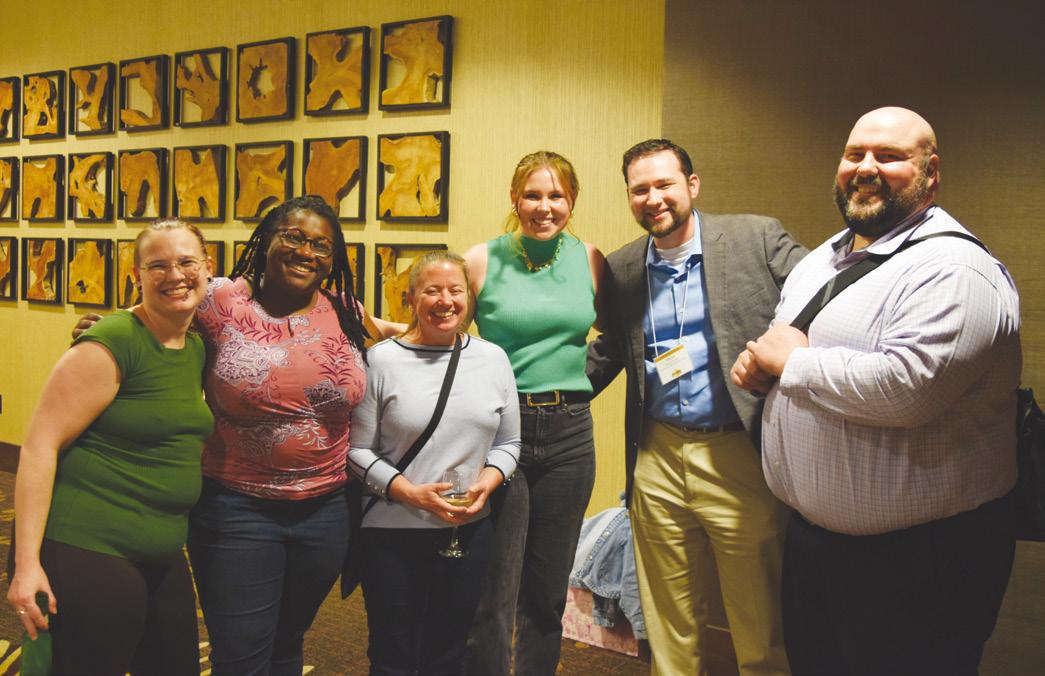

Dauphin County DA Fran Chardo, with help from Berks County DA John Adams, presents the last seminar of the day, “Asking the Right Questions: Tips for Effective Cross-Examination.”
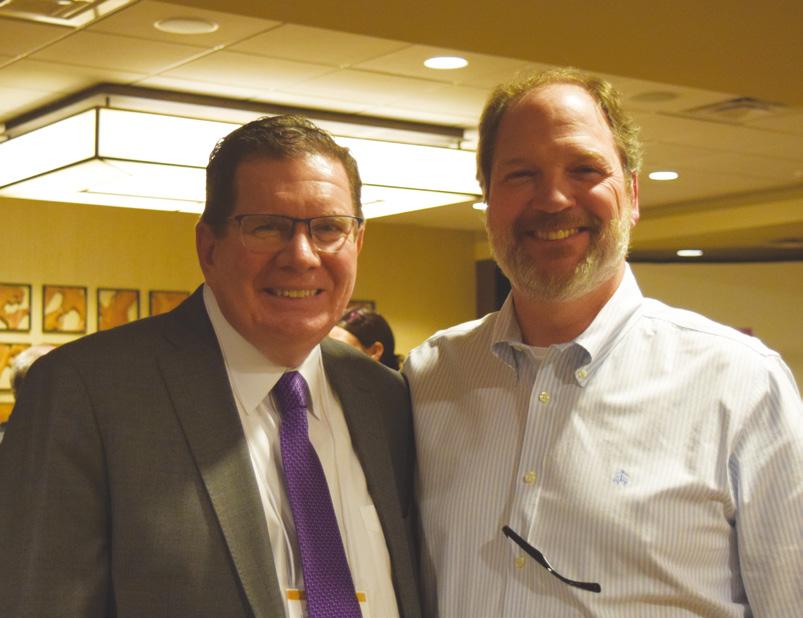
Judge Patrick Barrett and BCBA Vice-President Pete Schuchman catch up at the post-conference Cocktail Reception, sponsored by Customers Bank.
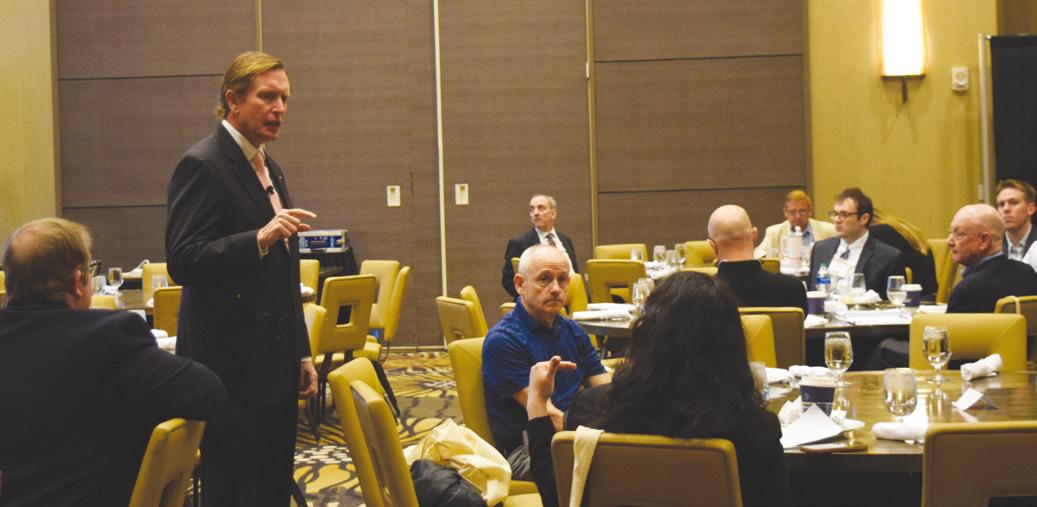
Fan favorite Paul Troy,
answers audience questions in the “Avoiding Malpractice” seminar.
Continued from page 29

Members chat with Customers Bank, who was this year’s Cocktail Reception sponsor.
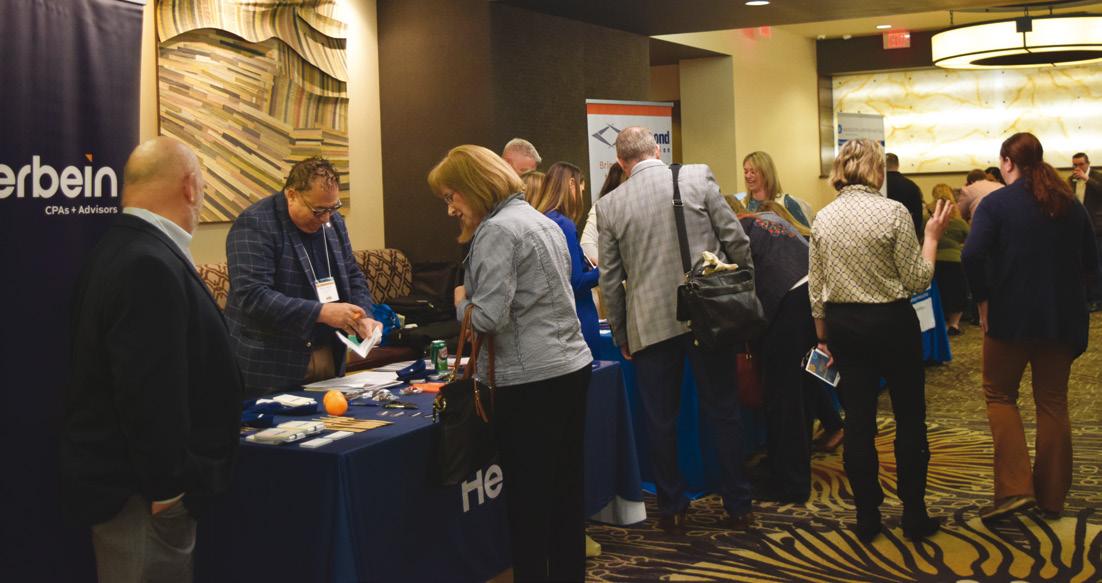
During a break between seminars, members visit Vendor Alley to learn more about their various services, pick up some swag, and get their “passports” signed for the raffle drawing.
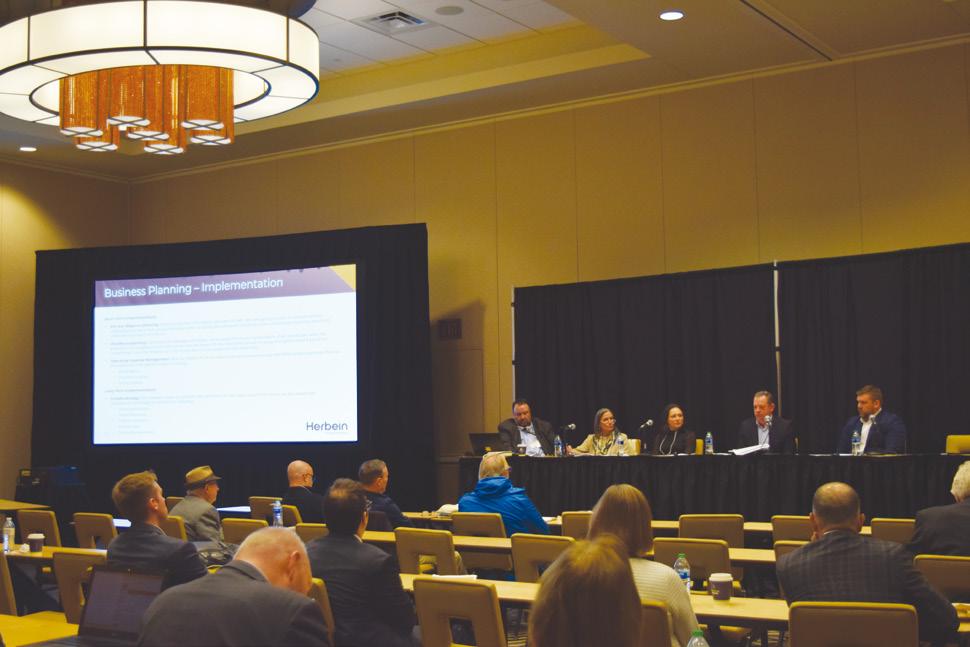
Representatives from Herbein + Co, a CPA advisory firm in Wyomissing, and Heidi Masano provide insights and strategies in the seminar titled “Business Exit Lifecycle: A Case Study Approach.”
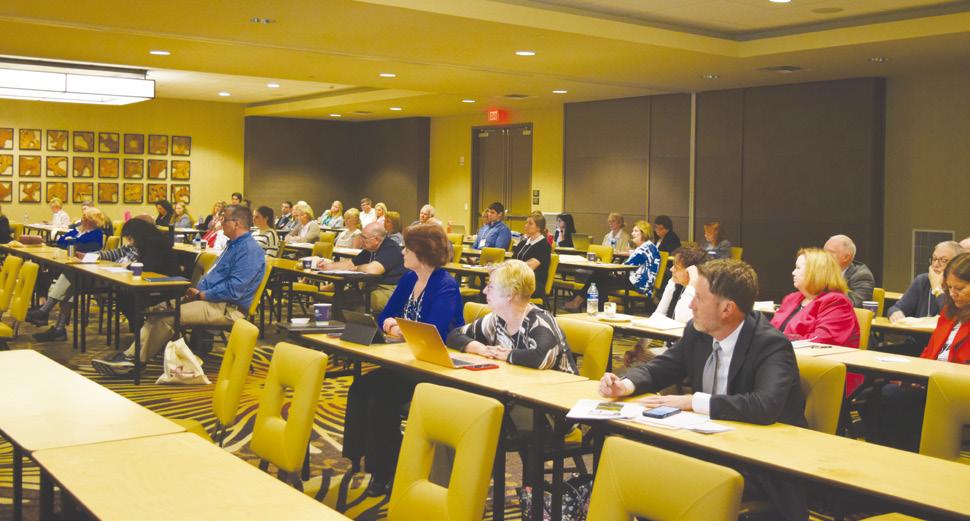
Family law practitioners attend “A Discussion of Counselling and Evaluations in Family Law Matters,” which explored various types of counselling and evaluations that may be utilized in family law cases from the perspective of the counselor and evaluator.
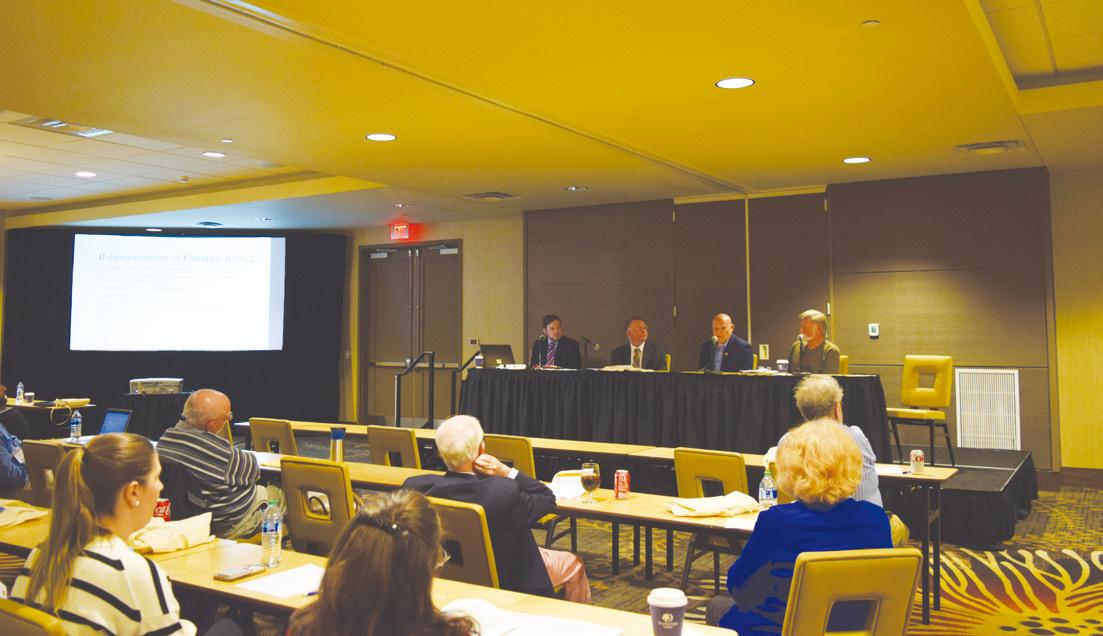

Conference attendees learn the implications of firearm laws and regulations across a multitude of practice areas in the seminar “Get Locked and Loaded for Firearms Issues in Criminal, Estate, and Family Law Matters.”



If you are a lawful permanent resident (green card holder) and are planning to apply for U.S. citizenship, our Gateway to Citizenship program is for you! Act now!
If you are a lawful permanent resident (green card holder) and are planning to apply for U.S. citizenship, our Gateway to Citizenship program is for you! Actnow!
Learn more!
Open House Apr. 2 &Apr. 4,2024 Jun.25 &Jun.27,2024 Sept. 24 & Sept. 25, 2024
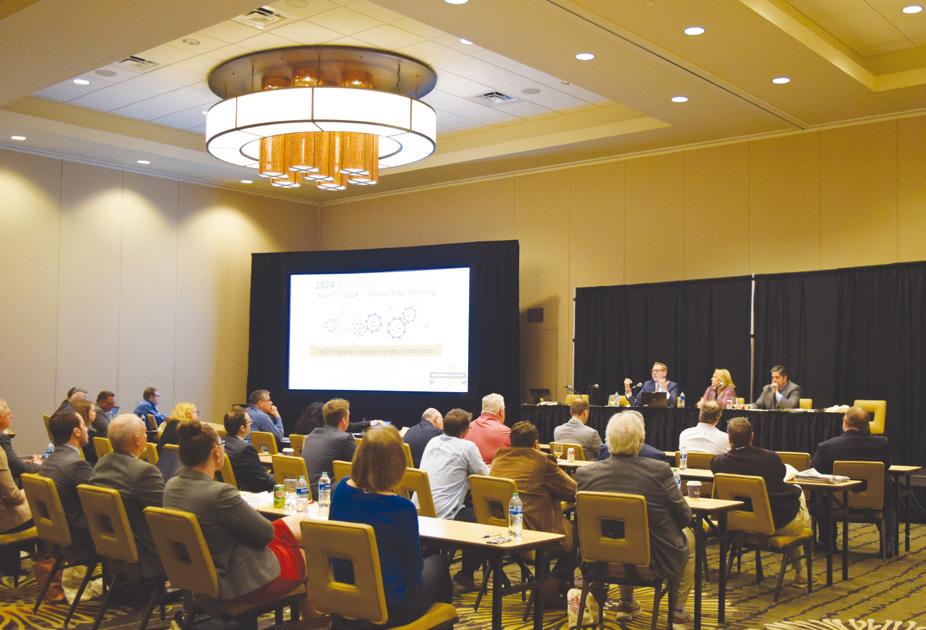
If you are a lawful permanent resident (green card holder) and are planning to apply for U.S. citizenship, our Gateway to Citizenship program is for you! Actnow!
Judge Benjamin Nevius, Judge Madelyn Fudeman, and Civil Litigation Section Co-Chair Jeff Bukowski provide updates on Civil Bench courtroom protocols and address other topics affecting civil litigators.
Learn about civics, American history and the U.S. government
Practice English vocabulary, literacy andconversation skills neededforcitizenship

Learn about civics, American history and the U.S. government
If you are a lawful permanent resident (green card holder) and are planning to apply for U.S. citizenship, our Gateway to Citizenship program is for you! Actnow!

&
Learn about civics, American history and the U.S. government
Practice English vocabulary, literacy andconversation skills neededforcitizenship
Learn about civics, American history and the U.S. government
Learn more! Open House Apr. 2 &Apr. 4,2024 Jun.25 &Jun.27,2024 Sept. 24 & Sept. 25, 2024 Dec. 17 & Dec. 19, 2024
Learn more!
6:30 p.m.

Learn what to expect on the day of your Citizenshiptest
If you are a lawful permanent resident (green card holder) and are planning to apply for U.S. citizenship, our Gateway to Citizenship program is for you! Actnow!
Practice English vocabulary, literacy and conversation skills needed for citizenship
Practice English vocabulary, literacy andconversation skills neededforcitizenship
Learn about civics, American history and the U.S. government
Connect withour immigration specialist partners at Aldea, who canhelpto answer your questions about the citizenshipprocess
Learn what to expect on the day of your Citizenshiptest
If you are a lawful permanent resident (green card holder) and are planning to apply for U.S. citizenship, our Gateway to Citizenship program is for you! Actnow!
Learn more!
Practice English vocabulary, literacy andconversation skills neededforcitizenship

9:00 a.m. Christ Episcopal Church 435 Court Street Reading, PA 19601
Open House Apr. 2 &Apr. 4,2024 Jun.25 &Jun.27,2024
Sept. 24 & Sept. 25, 2024 Dec. 17 & Dec. 19, 2024
Learn more!
Learn what to expect on the day of your Citizenship test
If you are a lawful permanent resident (green card holder) and are planning to apply for U.S. citizenship, our Gateway to Citizenship program is for you! Actnow!
If you are a lawful permanent resident (green card holder) and are planning to apply for U.S. citizenship, our Gateway to Citizenship program is for you! Actnow!
6:30 p.m.
9:00 a.m.
Open House Apr. 2 &Apr. 4,2024
Connect withour immigration specialist partners at Aldea, who canhelpto answer your questions about the citizenshipprocess
Learn about civics, American history and the U.S. government
Open House
Learn what to expect on the day of your Citizenshiptest
Apr. 2 &Apr. 4,2024
Practice English vocabulary, literacy andconversation skills neededforcitizenship
Jun.25 &Jun.27,2024
Connect withour immigration specialist partners at Aldea, who canhelpto answer your questions about the citizenshipprocess

Learn what to expect on the day of your Citizenshiptest
Connect withour immigration specialist partners at Aldea, who canhelpto answer your questions about the citizenshipprocess
A big thank you to Herbein + Co for supporting the Bar Association and the Bench Bar Conference as a Partnership sponsor.
Sept. 24 & Sept. 25, 2024
Learn what to expect on the day of your Citizenshiptest
Dec. 17 & Dec. 19, 2024
Connect withour immigration specialist partners at Aldea, who canhelpto answer your questions about the citizenshipprocess
9:00 a.m.
Jun.25 &Jun.27,2024
Literacy Council of Reading-Berks 35S. Dwight Street West Lawn, PA 19609
Christ Episcopal Church 435 Court Street Reading, PA 19601
Sept. 24 & Sept. 25, 2024 Dec. 17 & Dec. 19, 2024
Register Now!
6:30 p.m.
9:00 a.m.
Connect with our immigration specialist partners at Aldea, who can help to answer your questions about the citizenship process
Apr. 2 &Apr.
Literacy Council of Reading-Berks 35S. Dwight Street West Lawn, PA 19609
Christ Episcopal Church 435 Court Street Reading, PA 19601
6:30 p.m.
Register Now!
Learn about civics, American history and the U.S. government
Jun.25 &Jun.27,2024
Sept. 24 & Sept.
Dec. 17 & Dec.
Literacy Council of Reading-Berks 35S. Dwight Street West Lawn, PA 19609
Register Now!
Learn about civics, American history and the U.S. government
Practice English vocabulary, literacy andconversation skills neededforcitizenship
9:00
Christ Episcopal Church 435 Court Street Reading, PA 19601
Practice English vocabulary, literacy andconversation skills neededforcitizenship
Jun. 25 & Jun. 27, 2024 Sept. 24 & Sept. 25, 2024 Dec. 17 & Dec. 19, 2024
9:00 a.m.
6:30 p.m.
Christ Episcopal 435 Court Reading, PA
Learn what to expect on the day of your Citizenshiptest
6:30 p.m.
6:30
Christ Episcopal Church 435 Court Street
Learn what to expect on the day of your Citizenshiptest
Literacy Council of Reading-Berks
Literacy Council of Reading-Berks
Literacy Council Reading
Reading, PA 19601
Register Now!
35S. Dwight Street West Lawn, PA 19609 Register Now!

35 S. Dwight Street West Lawn, PA 19609
Connect withour immigration specialist partners at Aldea, who canhelpto answer your questions about the citizenshipprocess
Connect withour immigration specialist partners at Aldea, who canhelpto answer your questions about the citizenshipprocess
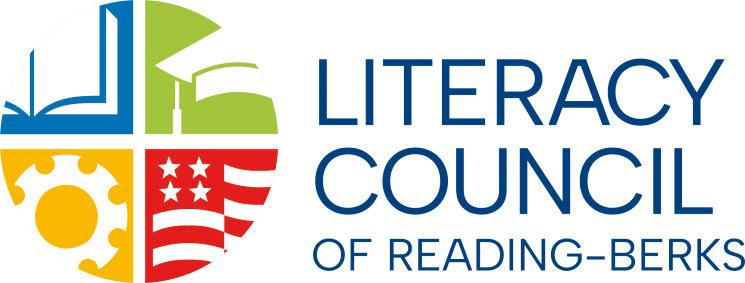

35S. Dwight West Lawn, Register

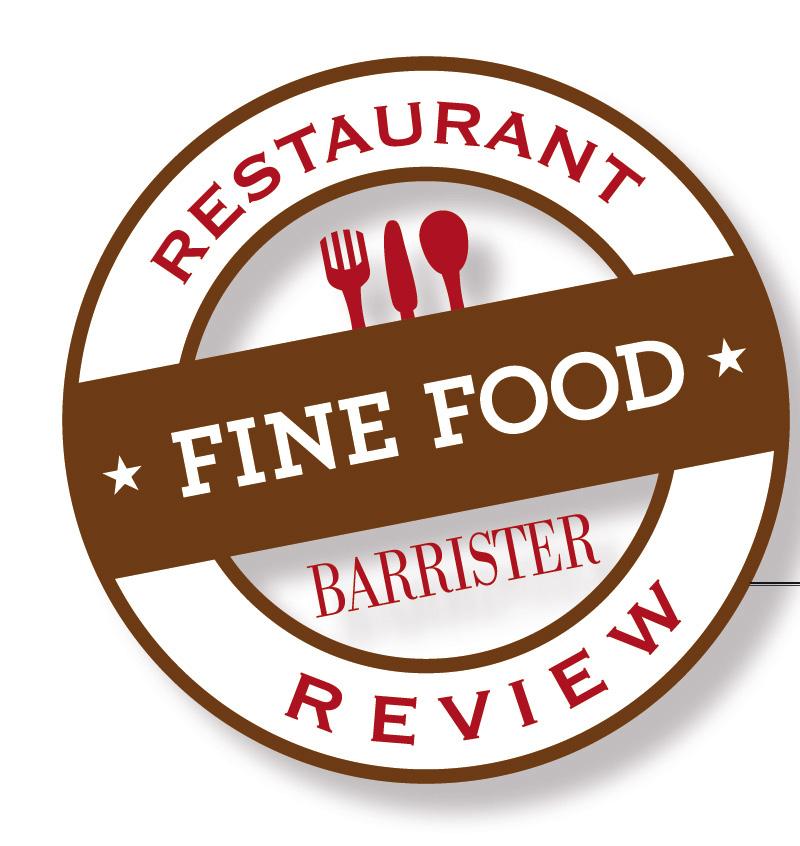


The antelope is one of the more adventurous appetizers on the menu.

Foie gras is a rich treat.

The thick cut house-made bacon layered with sauteed cabbage and sliced quail eggs may inspire you to serve a variation of this appetizer at home.
By Susan N. Denaro, Esquire
Sometimes trying to decide which restaurant to review is harder than deciding where to dine. There were three worthy contenders for this review: Birchrunville Hotel in Birchrunville, Osteria Avanti in Leola, Lancaster County, and Josephine’s in downtown Lancaster. Because tossing a two-sided coin won’t settle a three-way conundrum, I elected to review my Josephine’s experience merely because it is freshest in my mind.
Named for the famous dancer and jazz singer Josephine Baker, Josephine’s is located at 50 West Grant Street, in the heart of downtown Lancaster, near the Central Market. Reservations are required, and if you go, make sure to arrive early as parking can prove tricky in that part of town.
Despite being situated below street level, it is one of the most beautifully appointed restaurants I’ve seen lately. Boasting a piano in its snug bar area, the rest of the establishment is divided into several separate yet spacious dining rooms, one of the blessings of which is that the division helps keep the place from feeling too loud when at capacity. Our party of eight had no trouble hearing each other despite being at an elongated table in a side dining room.
Adhering to my mantra that no righteous night should ever begin with a salad, ours kicked off with some Hollywood-inspired cocktails that were so elegant one could easily imagine Josephine sipping them. My selection was the Fulton Spotlight which featured Aperol and fresh lemon juice. It might best be described as ‘bright’ tasting; it was the perfect accompaniment to the richness of the torchon de foie gras I chose as my appetizer. The larger than expected serving of foie gras was plated with lavash crackers, dried then macerated figs, and chopped pistachios. It is not hyperbole when I say the dish was sheer perfection, and it exceeded my every expectation.
My husband ordered the Tarte au Camembert appetizer, which was served with a tomato compote and a chilled arugula salad dotted with toasted pine nuts. Although the entire dish was a bit salty, it was all that a classic cheese course should be. One dish we expected to be salty, but was not, was the thickly cut house-made bacon layered with sauteed cabbage and sliced quail eggs. It was as tasty as it was pretty and inspired me to buy some thickly cut Neiman Ranch bacon the next day to make something similar with Brussel sprouts and red beet eggs in my kitchen.
The most surprising starter at our table, however, was the antelope dish a friend selected merely for the novelty of it. Served au poivre, the meat was tender, moist, and anything but gamey. My guess is that it should have been larger than the three-ounce serving because the seven of us who didn’t order it all had to try a bite. Because foie gras is too rich to eat often, I will likely opt for the antelope the next time I dine at Josephine’s.

Duck a l’orange features two perfectly cooked duck breasts, but the other ingredients on the plate are lost due to the entrée’s prevailing flavor: salt.

You will want more than a nibble of The Coconut, a complexly layered dessert.
Based upon the strength of my starter, my main course of duck a l’orange was a bit of a letdown. Beautifully plated, the dish featured two slices of duck breast, with the skin, perched over a carrot puree, the flavor of which was lost in the dish. The offering was dotted with some bite-sized potato balls and sauced with a saffron and orange infused sauce that also seemed to be lost on the plate. While the duck was perfectly cooked, the main flavor of the entree was salt. My spouse said the same thing about the rack of lamb, which he otherwise described as being cooked to perfection. The salt level was not so high in either entrée to be fatal, but full disclosure requires it be mentioned.
What was not over-salted was the lemon pepper barramundi entree another friend ordered. Served with a silky butter curry sauce over properly al dente black forbidden rice, the addition of peas and carrots brought a true splash of color to the plate. The spicy heat that wasn’t brought by the curry was supplied by the lemon pepper coating on the fish. It was equal parts inventive and delightful.
Our night at Josephine’s was a birthday celebration of sorts for six of the eight of us in our ‘Dinner Club’ so decorum required that we force ourselves to order dessert. Throughout our meal, two of the couples who had dined there before were raving about a lemon meringue dessert. Their descriptions of it reminded me of a similar dessert I had once upon a time at the now-shuttered Amorette restaurant on Prince Street in Lancaster, which closed following the Covid shutdown. When asked, our waiter confirmed that Josephine’s managed to poach Amorette’s very talented pastry chef, and the dessert we all remembered was now on the menu at Josephine’s.
Instead of the lemon-based sweet for our final course, we opted to split the vanilla bean crème brulée, one of my husband’s favorite desserts. I think the dish spent a little too long under the brulée torch as the custard was closer to room temp, a typical

This lemon pepper barramundi is an inventive and delightful entrée.

For those who want a salty starter, try the Tarte au Camembert served with a tomato compote and a chilled arugula salad dotted with toasted pine nuts.
misstep that I find disappointing as the contrast between the hardened sugar and the cold custard is my favorite part. What was not disappointing was The Coconut, one of the more complexly layered desserts I’ve tried lately. It had elements of mango and blood orange that were served in a scrumptious dark chocolate and coconut shell that was nestled on top of diced pineapple; one bite of it was simply not enough as it left me wanting more.
I would be remiss if I didn’t mention that the service at Josephine’s was pitch perfect. Our waiter was utterly delightful and his timing for when to appear was spotless. His charm helped smooth over some of the rough spots like the oversalted food. A true professional, he reminded us that the gratuity was already included in the bill, and he honored our request for separate checks without hesitation.
While the experience had some hits and some misses, the best part was being there with like-minded foodie friends who were intrepid enough to order the more unusual dishes like the bison entrée (not mentioned here because one bite was not enough to understand the dish) and the antelope starter, which I would order next time for the sheer novelty of it. We would go back again with them anytime, especially if the barramundi and The Coconut are still on the menu.
Although I picked Josephine’s for this column, it should be noted that my meals at the Birchrunville Hotel and at Osteria Avanti were wonderful, and I highly recommend both. The most fun difference among the three places is that the restrooms at Josephine’s, which have whimsical unicorn-shaped faucets, are worth a visit just to see the old Hollywood photos of celebrities in bathrooms.
Ms. Denaro is with the Wyomissing firm Plank Frankowski.

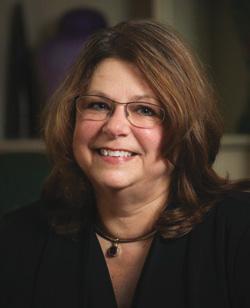

On March 8, members gathered in Slapshot’s Corner at the Santander Arena to watch the Reading Royals take on the Norfolk Admirals. The night ended with group photo on center ice!
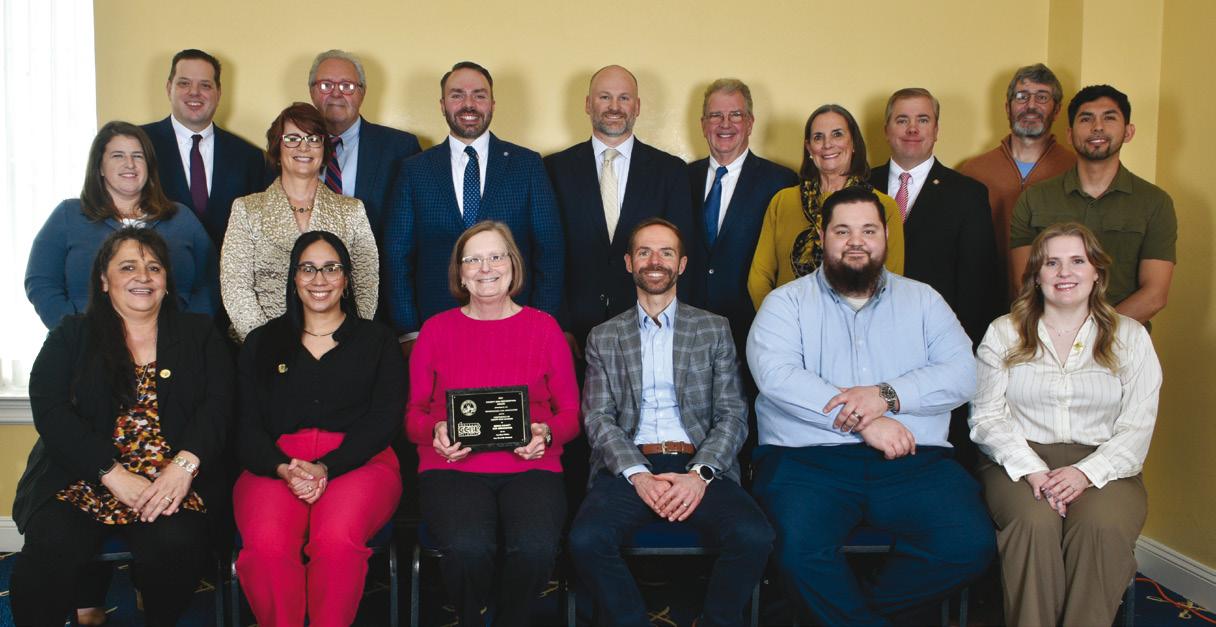
Also at the 58th Annual Conference of County Bar Leaders on March 1, the Bar Association received a County Bar Recognition Award for the advancements achieved over the last year in improving jury diversity and coordinating pro bono clinics to help the community’s most at-need groups.
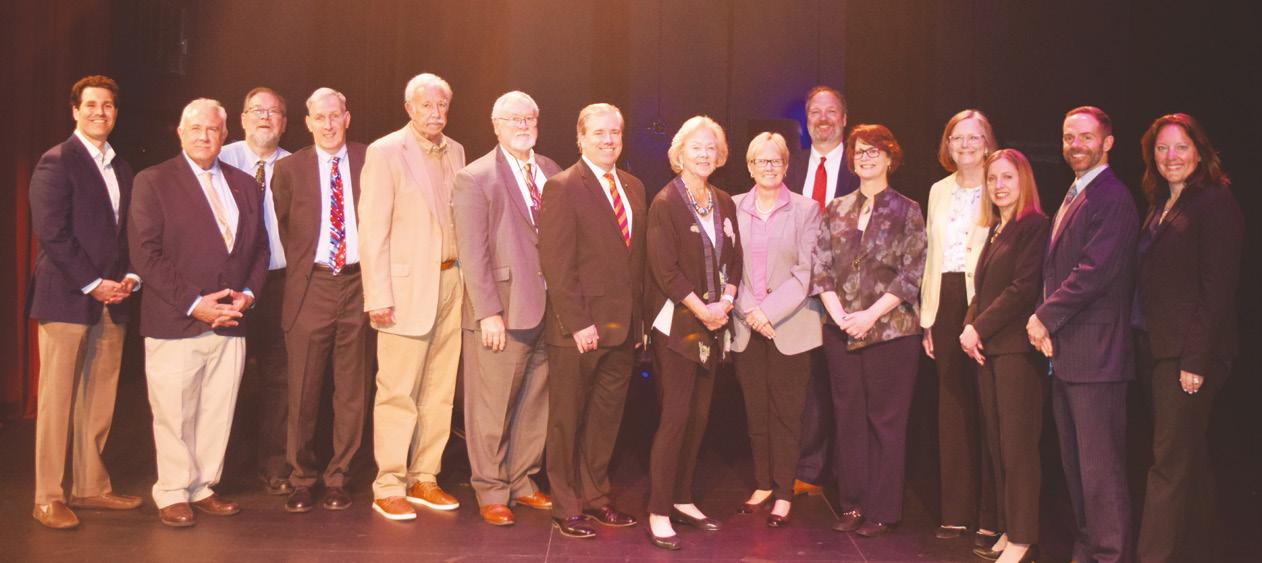
On April 18, members
students

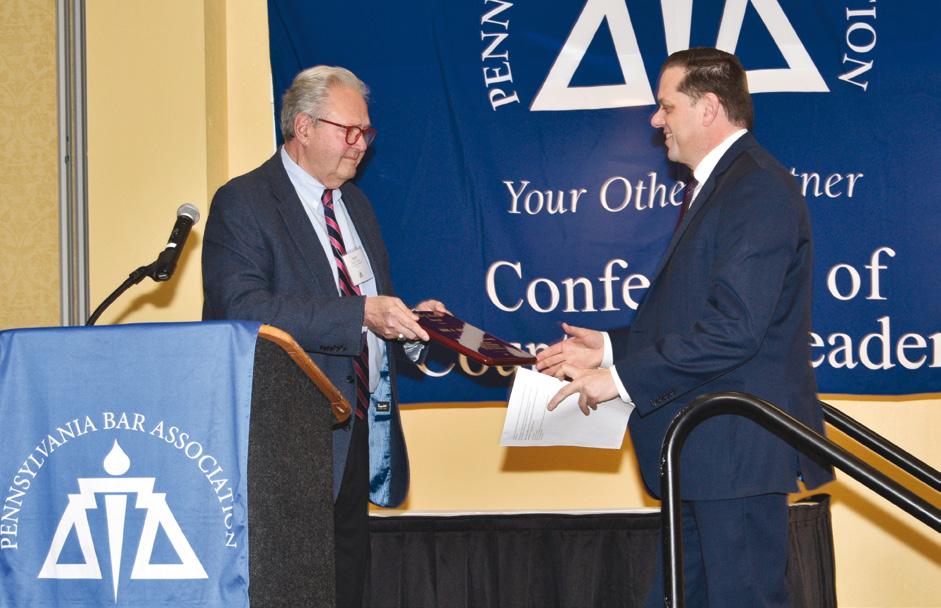
BCBA Executive Director Kori Walter was recognized at this year’s Conference of County Bar Leaders in Gettysburg with the Arthur J. Birdsall Award on Friday, March 1. The Birdsall Award is given to recognize a bar executive who has been a faithful steward of bar traditions, who is committed to the success of his or her bar association, who has enhanced significantly the stature of his or her bar association, who cooperates with other bar executives and bar leaders to make CCBL the best it can be, and who puts him or her self second to the needs of the bar association.
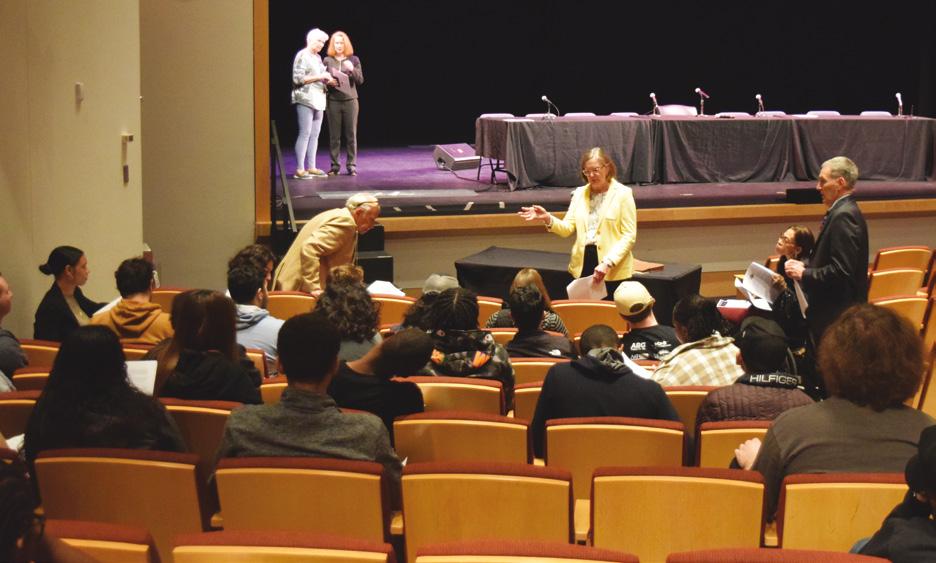
whether public school
disrupt the work and discipline of school when that speech occurs over a student’s personal cell phone.



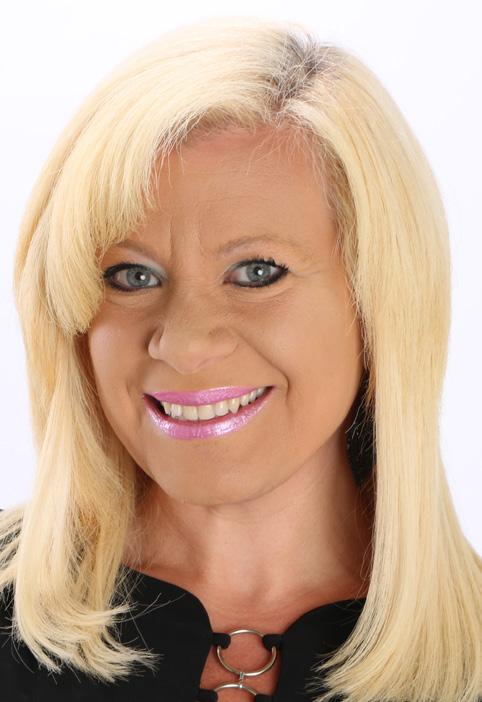







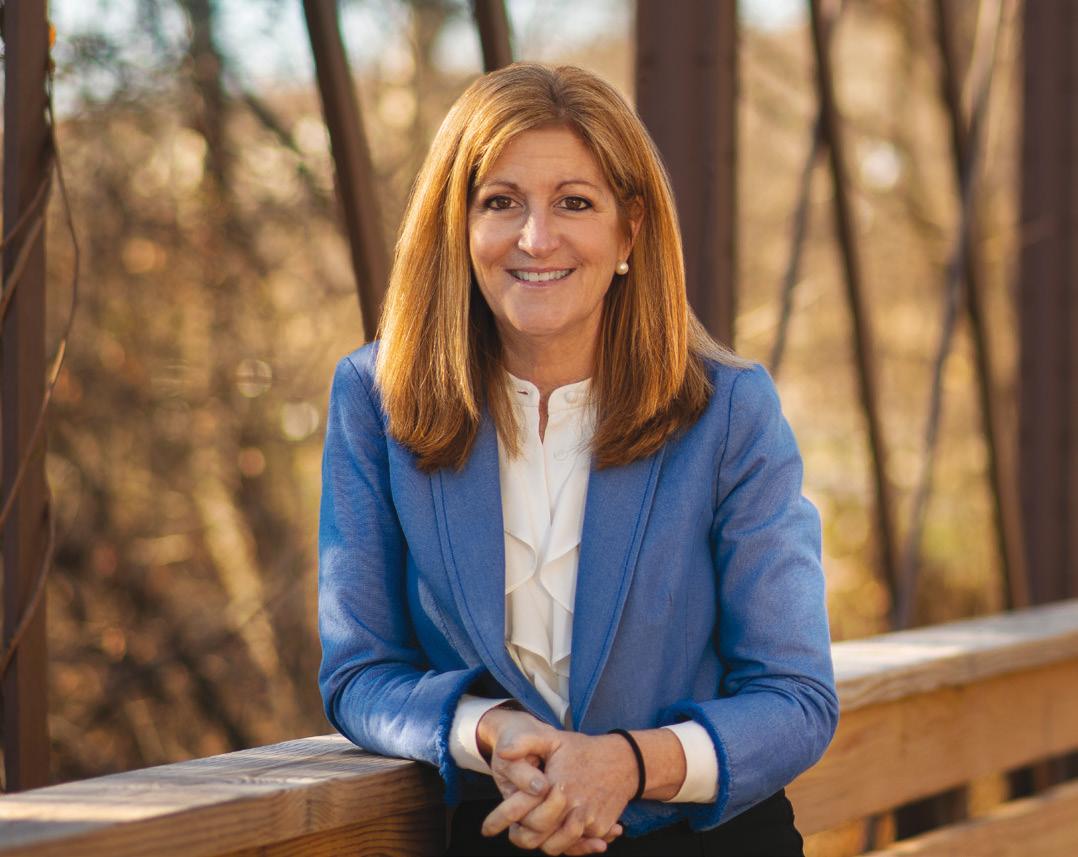


Berks County Judge Jill M. Scheidt presided over a naturalization ceremony that welcomed 38 new American citizens on April 3 in Courtroom 5A of the Berks County Courthouse. Chris Baran, Officer for the United States Bureau of Citizenship and Immigration Services, presented certificates of citizenship to the newly naturalized citizens, who originated from 15 different countries, including Israel and Syria. Mr. Peter Rye, of Brentwood Industries, shared his family’s story of immigration, the efforts of his father who moved their family to the area and worked his way to purchasing what is known today as Brentwood Industries, and his experience of receiving his citizenship in a naturalization ceremony in the very same courtroom. Many members of the community joined the celebration, including Wilson High School JROTC, who presented the colors, and Norah Klinger of Holy Guardian Angels Regional School, who sang the national anthem.
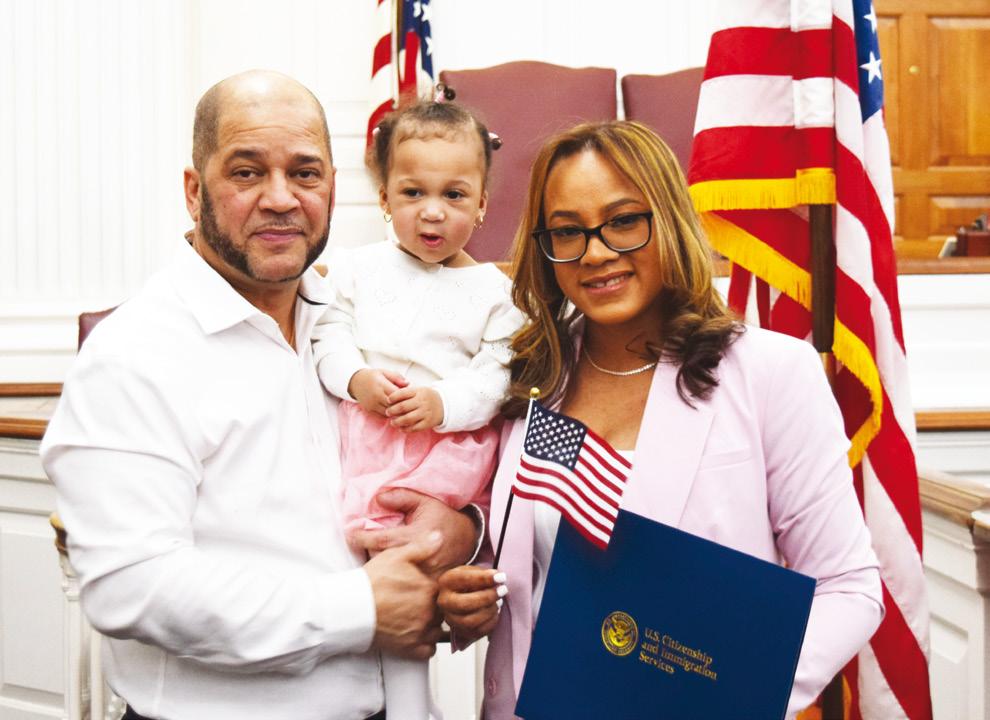
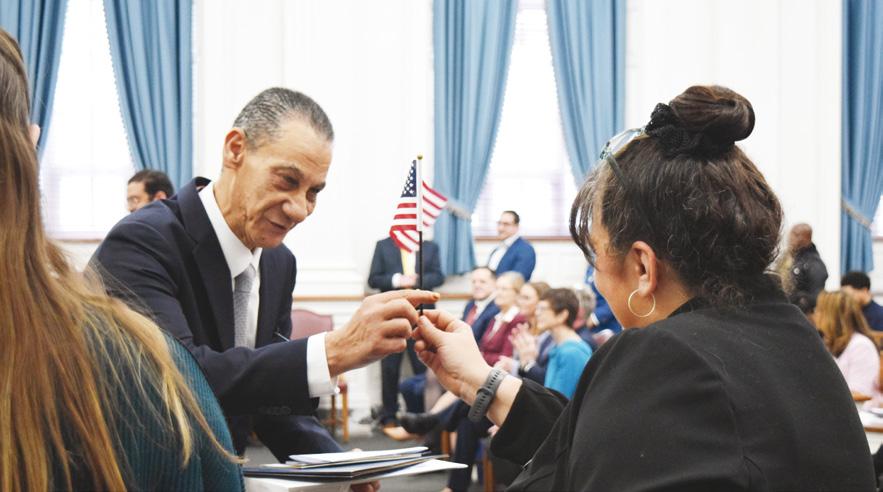
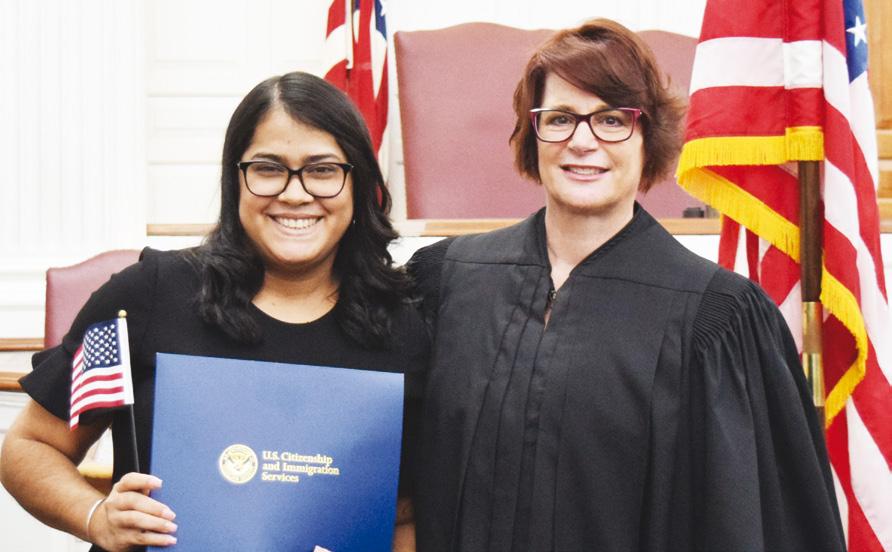
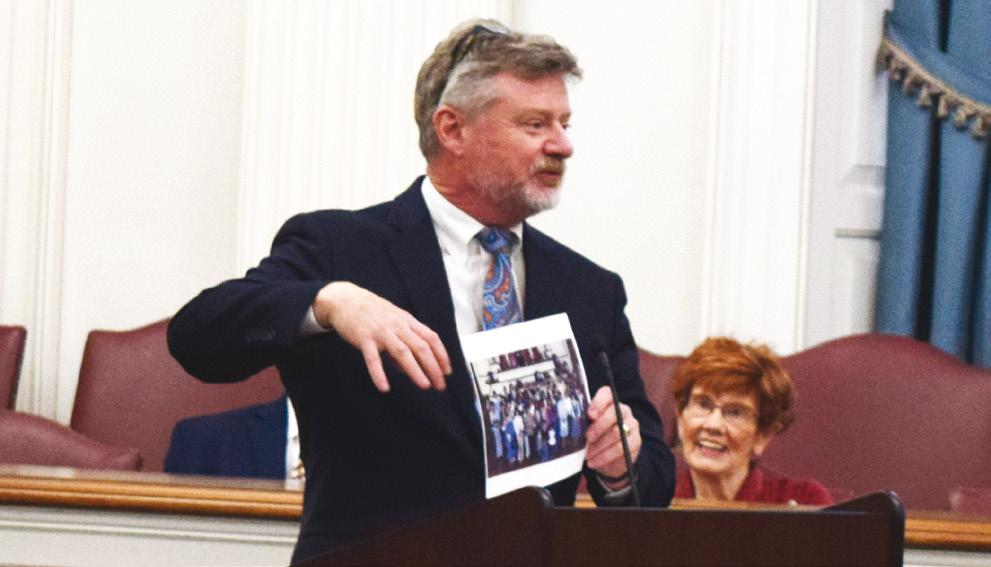



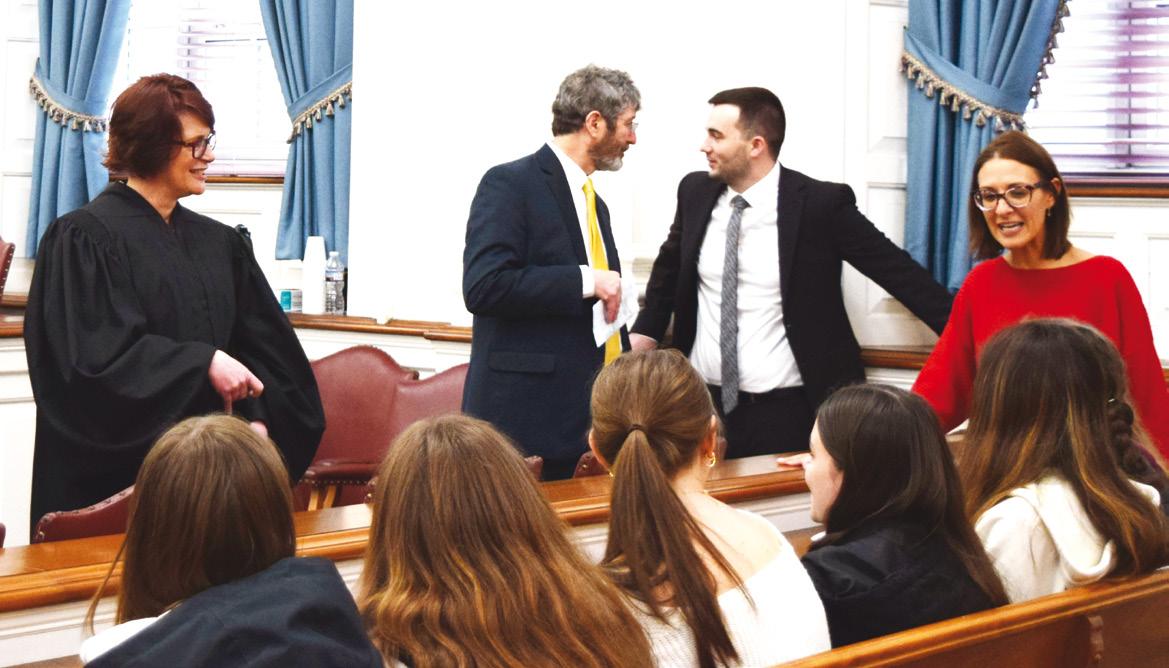
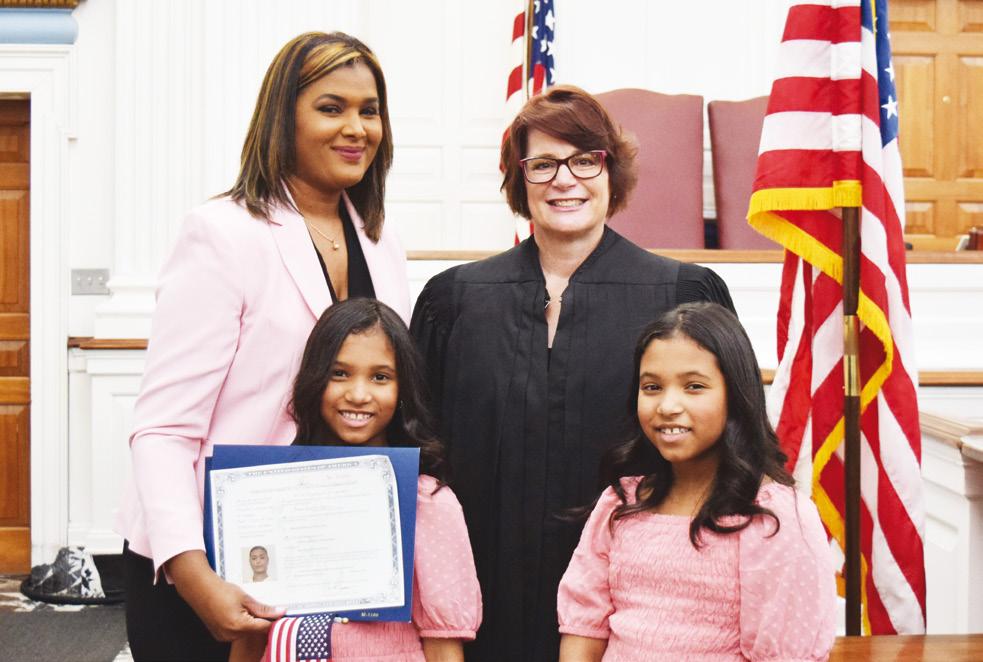
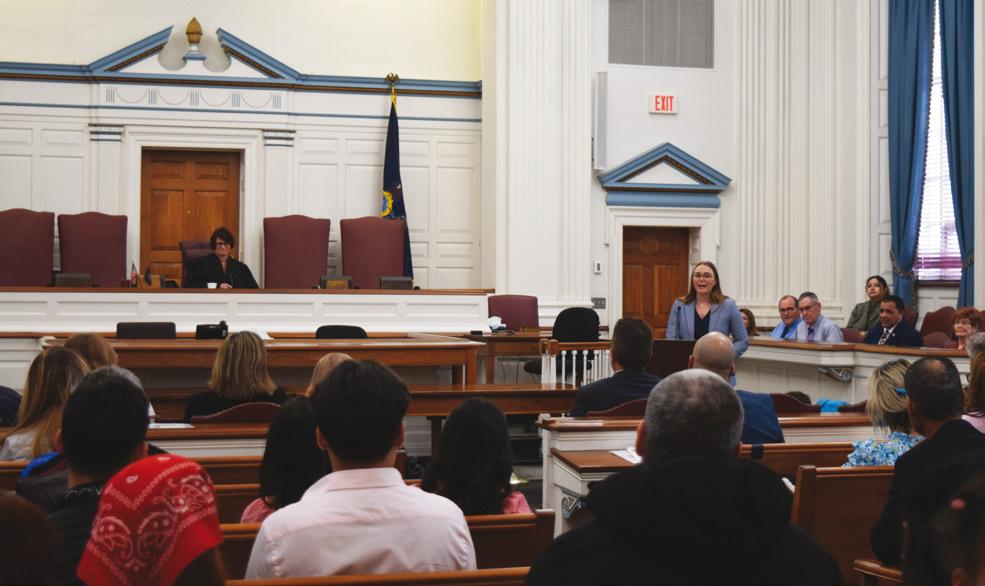



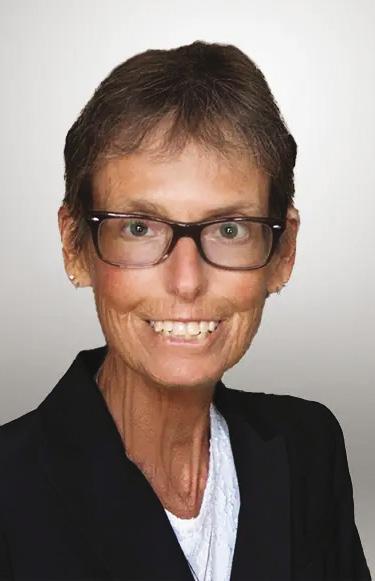
Barrie Gehrlein, an active member of the Berks County Bar Association Civil Litigation Section and a valued member of the Alternative Dispute Resolution panel, died on February 16. She was 61.
Gehrlein grew up in Chester County, graduating from high school in Downingtown. She earned a Bachelor of Arts in English at Lafayette College and a Juris Doctor from the Widener University School of Law in Delaware.
At the time of her passing, Gehrlein was an attorney in the Wyomissing office of Johnson Duffie Attorneys at Law. Her practice areas included Insurance defense, motor vehicle liability, trucking and transportation liability, premises liability, construction, product liability, and commercial liability.
With her extensive knowledge and experience as a litigator, Gehrlein was working with members of the bar and judges on revamping the scheduling process and local rules for the Civil Division of the Court of Common Pleas of Berks County. She is a recipient of the Berks County Bar Association Presidential Award of Merit for her exemplary work revising the Court’s local rules for arbitration.
“Barrie was a true professional, with a sense of balance and ethics,” Berks County Bar Association member Peter N. Munsing wrote in a tribute posted on Legacy.com. “No cheap shots or planned ‘surprises.’”
Debra Kos, a liability claims manager with Erie Insurance, said she had known Gehrlein for 20 years.
“She was an excellent attorney and a wonderful person,” Kos wrote in a Legacy.com tribute. “Every time I spoke with her, she made me laugh. She was the bravest person I’ve ever known. I’m so thankful our paths crossed. She is greatly missed!”
Johnson Duffie hosted a “Celebration of Life” reception for Gehrlein at the Bar Association on April 25.
By Donald F. Smith, Jr., Esquire
Iwas excited to read the opinion of Judge J. Benjamin Nevius published in the Berks County Law Journal on September 21, 2023. Why would that excite me?
First, it takes little to excite this old, retired-for-the-most-part attorney. Second, it involved personal injury law, which had been my area of practice, and not a criminal or family law case that dominate the opinions available to be published by the Journal. Third, it discusses an issue I explored in the article “No Rest for Rest Home Litigation,” appearing in the Fall 2016 edition of The Berks Barrister. Fourth, unlike other local judges in the past, the 14-page opinion thoroughly reviews the applicable law, including federal and state court decisions.
The opinion is found at John Slaughter, III v. Genesis HC, et al, 115 Berks L.J. 462 (2023) and involves the enforceability of a nursing home’s arbitration agreement. The Defendant sought to arbitrate the Plaintiff’s negligence claims on behalf of the Decedent under the Wrongful Death Act and the Survival Act and not be forced to litigate them before a jury as the Plaintiff’s Complaint seeks.
My excitement by its publication is tempered only slightly by the fact that the opinion was lodged only after the nursing home owner had appealed the order of Judge Nevius, who denied its preliminary objections seeking enforcement of an arbitration agreement.
Writing on this page in the Spring 2020 issue, I decried the dearth of civil opinions the Law Journal Editor had available to select for publication. When I was BCBA’s executive director, one judge told me he only issues an opinion when a case is appealed. In the column, I noted my experience as a law clerk for thenPresident Judge W. Richard Eshelman more than forty years before. His approach, if the issues had been briefed and argued by counsel, even if involving preliminary objections, was to at least provide reasons as part of the resulting order, but frequently an explanatory-written opinion was promulgated.
Opinions are intended to educate the parties and, if published, provide
guidance to the entire trial bar. Besides, after expending efforts to advocate their case, are not the attorneys and their clients deserving of a written explanation for the ruling? It may even obviate the need for a senseless appeal.
The losing party in Slaughter listed eleven issues in its Concise Statement of Matters Complained of on Appeal. In a footnote (fn. 19 at p.474), Judge Nevius notes he made no findings in regards to many of the issues listed in the Statement. A check of the docket disclosed he actually
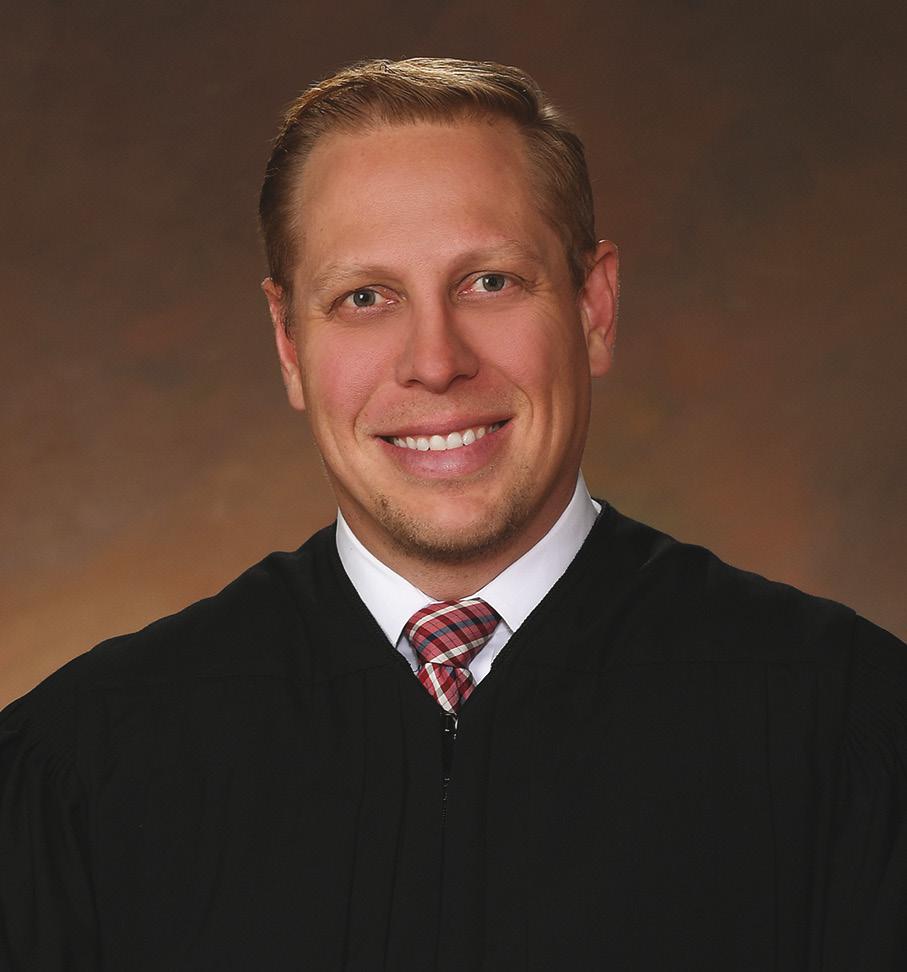
provided no reasons in his Order to justify denying the preliminary objections, leaving it to the Defendant to guess what issues needed to be preserved on appeal.
While knowing the exact reasoning for the denial may not have stopped the Defendant from appealing the Order, such knowledge would certainly have resulted in a more focused appeal. As it turns out, the Defendant was apparently so convinced by the opinion lodged by Judge Nevius on July 3 that it discontinued the appeal less than a month later, on August 1. If only…
The appeal truly was a loser. The Plaintiff had been the Decedent’s powerof-attorney at the time of the Decedent’s admission to the facility. He testified by deposition he never received the first three pages of the four-page agreement but admitted he signed the fourth page and returned it. Also, arbitration was never
explained to him.
The Defendant’s representative confirmed she only received the one page but never followed up. The Defendant failed to produce into evidence the first three pages of the actual agreement applicable to the Decedent’s admission and instead only submitted a copy of a Sample Agreement.
Such was correctly found not to establish the terms of the agreement sought to be enforced in this case. Judge Nevius explains, “the first three pages of the Sample Agreement contain virtually all of the critically important terms governing the parties’ rights and obligations…Most importantly, for purposes of this analysis, page one contains the very waiver of the Decedent’s right to a trial by jury at issue here.”
Citing prior appellate case law, Judge Nevius writes that no arbitration “contract will be found to exist where its essential terms are unclear.” Here the Plaintiff expressed no knowledge of the essential terms, and proof to the contrary was not provided by the Defendant.
It is good that Judge Nevius has weighed in with such a well-reasoned opinion in this growing area of litigation and that our Law Journal published it. A cynic might think a second reason for the appeal being discontinued was that the Defendant did not want the entire Plaintiffs’ bar of Pennsylvania to learn of its sloppy admission process.
Moving on, in a municipal collective bargaining action, another civil judge did not wait to explain her decision. On October 19, 2023, the Law Journal published an opinion by Judge Fudeman explaining why she denied a motion for a preliminary injunction. It was not written in response to an appeal being filed. More excitement!
Looking ahead, may our civil judges continue to provide this old man with such excitement.
Mr.
Smith is Executive Director Emeritus of the Berks County Bar Association.
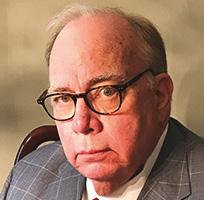

We’re bullish on your future. When we work together, you get personalized guidance, insights and financial planning — all designed to connect your life with your finances and to help make the path toward your goals even clearer. Let’s have a conversation.
Maggs & Associates
Merrill Lynch Wealth Management
985 Berkshire Blvd., Suite 200
Wyomissing, PA, 19610
610.320.5462
fa.ml.com/maggs